- Writing Prompts

60+ First Line Writing Prompts
Did you know that the opening line of a story is one of the hardest parts of writing a great book? Spark your imagination with these 100+first line writing prompts for all ages! These simple one-liners are the perfect way to get those creative juices flowing and find inspiration for your next big short story or flash fiction .
We have a mix of first-line writing prompts, ranging from fantasy prompts to non-fictional and realistic events. As well as prompts written in the first and third-person view. The one-line writing prompts in this post are a great way to challenge yourself to write something new. In fact, you can even set yourself a challenge to write at least 300 words every day for each of these cool prompts!
60+ Random First Line Writing Prompts
Here are over 60 one-line opening sentences to help you write your next big story:
- “Er… I hate this song. Why is it always playing on the radio?”
- Every story has a hero and I’m the hero of this one.
- Thunder rattled outside, as Emily tossed and turned trying to sleep.
- Life wasn’t great at all for Mr Pea. It wasn’t even mildly good.
- They keep calling me “special”, but what’s so special about me?
- Gavin was always getting the best presents. For once I wish I could be like him.
- Balloons popping, confetti dropping and food flying. That’s how Katie spent her birthday each year.
- Every night, Peter went out to save the world in his own little way.
- If dogs could speak, then Spike would be thanking Chris right now.
- Money is everything.
- Was it really Jane’s fault?
- Every day the same thing keeps happening.
- For the first time in her life, Janie felt powerful.
- 5 AM and still no phone call.
- Mom’s always telling me to come straight home.
- There’s an old legend that talks about magical fairies living in the forest.
- Snow fell, as Clarissa made her way home.
- After the accident, Nelson never felt safe again.
- Katie’s living the dream up in the hills of Hollywood.
- The world seemed like such a big place, until the recent discovery in Antarctica.
- “Dear diary, today I learned something about myself…” Katie mumbled to herself.
- Blinded by a bright light outside his window, Jake jumped up in horror.
- Sitting at his computer, Martin noticed something odd about his favourite computer game.
- Rain trembled down the window, as the car radio played in the background.
- “Ready or not, here I come!” shouted Millie in the distance.
- Once upon a time, there lived a young prince with extraordinary powers.
- James had it all, but still, it was not enough.
- Her red hair glistened in the sun, as she walked across the car park.
- Mel was always haunted by her dreams.
- “Shhhh! It’s your turn now” whispered Kelly.
- The room was a dump, as Jack frantically searched every corner.
- This time daddy brought a strange teddy bear home.
- There’s no cure for a beast like me.
- People ran inside their homes, as the alarm rang.
- Tracking through the woods, Christian found something strange.
- Home. What is home anyway?
- Legend says that if you breathe in and out ten times in front of a mirror something strange happens.
- Tick… tock… tick… tock… time was going so slow.
- The pain was too much, he had to leave right now.
- Slipping out of reach, she lost it forever.
- Money, clothes, food, everything you need for a quick getaway.
- In the faraway kingdom of Rainbow Popsicles, everything was sweet, apart from one strange-looking thing.
- In the damp streets of Manhattan, there lived a fierce little cat.
- Being the ‘odd one out’, the ‘weird’ one wasn’t fun at all.
- “Ahhhhhhhhhhh!” Shelly screamed in her sleep.
- Some say the number 7 is unlucky, but to me, it wasn’t.
- Every Saturday, Joe went to his Grandma’s house, but something was very different this week.
- Chores, chores and more chores.
- For once I wish I could get my way.
- The sun shone brightly on Oakland farm, but not all was bright.
- “I got one! I got one!” shrieked Sally, jumping up and down in excitement.
- She was everything I wanted to be and more.
- The same words over and over again scattered all over the floor.
- The scariest creatures lived deep in the forest where no-one ever went.
- “Abra Kadabra, turn these ripped trainers into the fastest trainers in the world!” exclaimed Victor.
- The desert-like sun burned his skin as he lay scorching in the sand.
- The sound of rustling leaves turned George’s heart to stone.
- Sunny Slimeville was just a normal town with a funny name.
- The phone did not stop ringing all week.
- Another tea party, another game.
- How’s a country girl like me ever going to survive the big city?
- Did you know that not all zombies eat brains?
How To Use These One-Line Writing Prompts
There are a number of ways you can use these first-line writing prompts to inspire your story writing , such as:
- Pick one of the opening sentences and free-write for at least 60 seconds. Don’t stop to think, just keep on writing whatever comes to mind!
- Don’t keep skipping through all of the prompts above. Challenge yourself and give the ‘hard’ or ‘boring’ ones a go! You never know how they’ll inspire you unless you give them a go.
- Feel free to adapt these first-line writing prompts in any way you like. You can change the character names, point of view and any other details you feel like.
- Explore your imagination. Don’t be afraid to add more characters, add conflict, add dialogue , add anything you like to really have fun with these prompts!
For more inspiration, check out this list of over 150 story starters . Now go and choose an opening sentence from the above list! And if it inspires you to write something cool, let us know in the comments! You can even publish your story online – Just sign-up to create your free account .
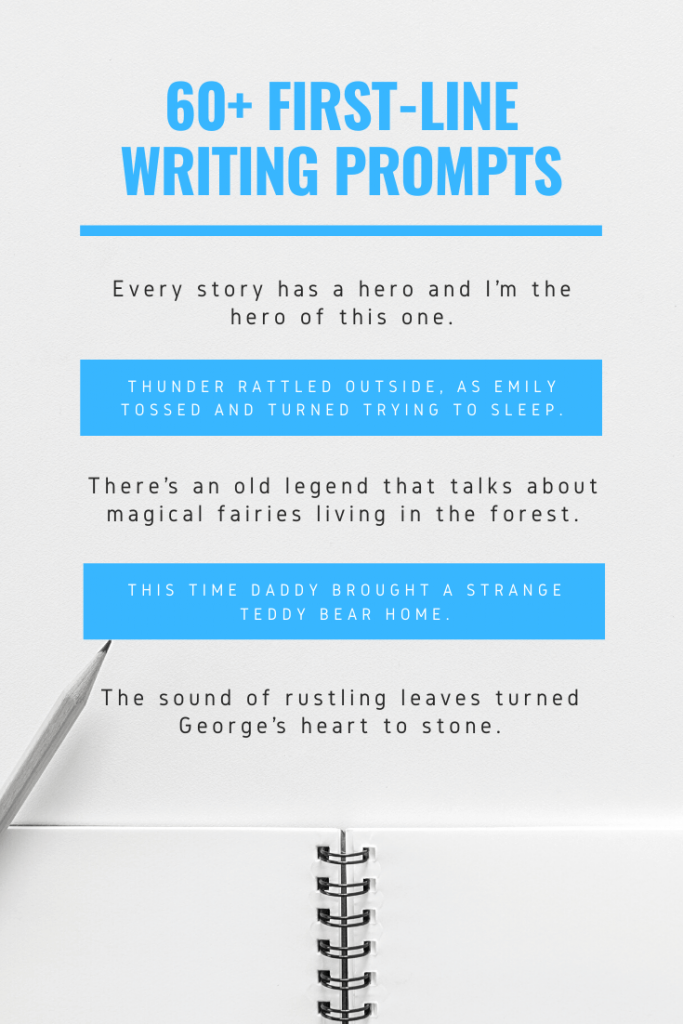
Marty the wizard is the master of Imagine Forest. When he's not reading a ton of books or writing some of his own tales, he loves to be surrounded by the magical creatures that live in Imagine Forest. While living in his tree house he has devoted his time to helping children around the world with their writing skills and creativity.
Related Posts
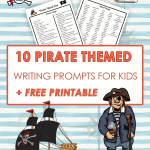
Comments loading...
TRY OUR FREE APP
Write your book in Reedsy Studio. Try the beloved writing app for free today.
Craft your masterpiece in Reedsy Studio
Plan, write, edit, and format your book in our free app made for authors.

Blog • Perfecting your Craft
Last updated on Aug 16, 2023
How to Start a Story: 10 Top Tips From Literary Editors
This post has been written with contributions from editors and authors including Tom Bromley , Fran Lebowitz , and Rebecca Heyman .
The opening lines of a story carry a lot of responsibility. They act as an invitation for someone who’s glanced at the first page of your book to either put it back down or keep reading.
To help us understand how bestselling authors open up their stories, we've asked for tips from ten of Reedsy's top professionals.
How to start a story:
1. Craft an unexpected story opening
2. start with a compelling image, 3. create interest with immediate action, 4. begin the book with a short sentence , 5. pose a question for the reader, 6. engage a sense of curiosity, 7. build a convincing world and setting, 8. do something new with your writing, 9. create tension that has room to grow, 10. capture your readers’ attention.
Some of the most memorable opening lines are ones that hook readers with something out of the ordinary. Literary editor Gareth Watkins often encourages writers to explore this in their own books.
"Think of the opening to Nineteen Eighty-Four , or Iain Banks’s, The Crow Road (It was the day my grandmother exploded ). Of course, your opening doesn’t have to be as outrageous as these but always aim for the unusual.
"In other words: think of how people will expect the book to start, then take the plot in another direction."
Example: Nineteen Eighty-Four , George Orwell

Orwell immediately alerts the reader to the fact that we're not in a normal world by deploying a single strange fact at the end of Nineteen Eighty-Four's opening sentence
It was a bright cold day in April, and the clocks were striking thirteen.
However, not all books need to start with a twist. Sometimes, all you need is a single strong image.
Tweet "We asked our editors: "how would you start a story?" They came up with 10 insightful ways #amwriting"]
Many editors will tell you to avoid exposition — the dreaded info dump — at the start of your manuscript. Editor Harrison Demchick suggests one of the best ways to avoid this is to begin with an image.
"By focusing on sensory detail right at the start — sight, sound, taste, touch, smell — and by conveying a particular, defined setting, you can immediately absorb readers within your novel's tangible world.
"Context and background will come later, but a compelling image can be a fantastic hook."
Example: Fahrenheit 451 , Ray Bradbury
The image of fire is central to Bradbury's dystopian classic. Appropriately enough, he opens his novel with a maelstrom of images comparing the fire to a snake and a symphony.
It was a special pleasure to see things eaten, to see things blackened and changed. With the brass nozzle in his fists, with this great python spitting its venomous kerosene upon the world, the blood pounded in his head, and his hands were the hands of some amazing conductor playing all the symphonies of blazing and burning to bring down the tatters and charcoal ruins of history.
Starting with an image requires a deft hand from the writer. This image must be compelling enough to make the reader continue turning the pages. A simpler alternative may be to throw readers into the middle of the story.
Novels that open in medias res (Latin for "in the midst of action" ) are often really effective at immediately grabbing the reader and establishing stakes and tension.
However, editor Jeanette Shaw warns that readers can become untethered without context and a central character. "If you go this route, you must be sure your opening action is compelling enough that the reader is prepared to wait for character setup later."
Example: Lord of the Flies, William Golding
This classic novel starts with a scene of young boys living on a deserted island with no adults in sight. Only later do we learn how they got there in the first place.
The boy with fair hair lowered himself down the last few feet of rock and began to pick his way toward the lagoon. Though he had taken off his school sweater and trailed it now from one hand, his grey shirt stuck to him and his hair was plastered to his forehead.
PRO-TIP: Want to find out which famous author you write like? Take our 1-minute quiz below!
Which famous author do you write like?
Find out which literary luminary is your stylistic soulmate. Takes one minute!

As Polonius tells young Hamlet, brevity is the soul of wit. But for editor and literary agent Fran Lebowitz (who has represented the Bridgerton novels amongst other bestsellers), being frugal with your opening sentence can also intrigue a reader and force them to lean in: "Start with something sparse that flicks on our curiosity, above all."
Example: The Hobbit , J.R.R. Tolkien
For a man who's known for writing lengthy tomes, Tolkien opens up his novel, The Hobbit, with a simple and matter-of-fact sentence that introduces something readers had never encountered before: a hobbit.
“In a hole in the ground there lived a hobbit.”
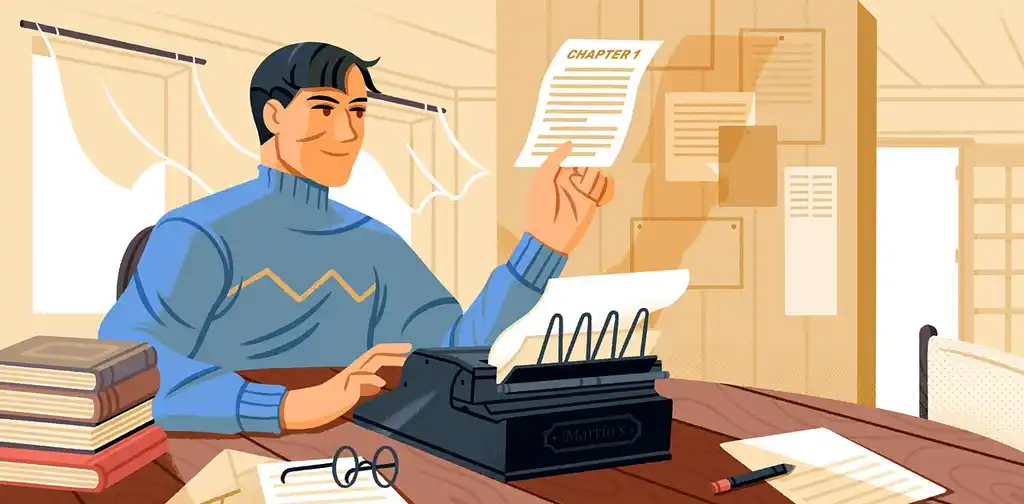
FREE COURSE
How to Write a Novel
Author and ghostwriter Tom Bromley will guide you from page 1 to the finish line.
But sometimes, a simple question can be just as powerful as a statement.
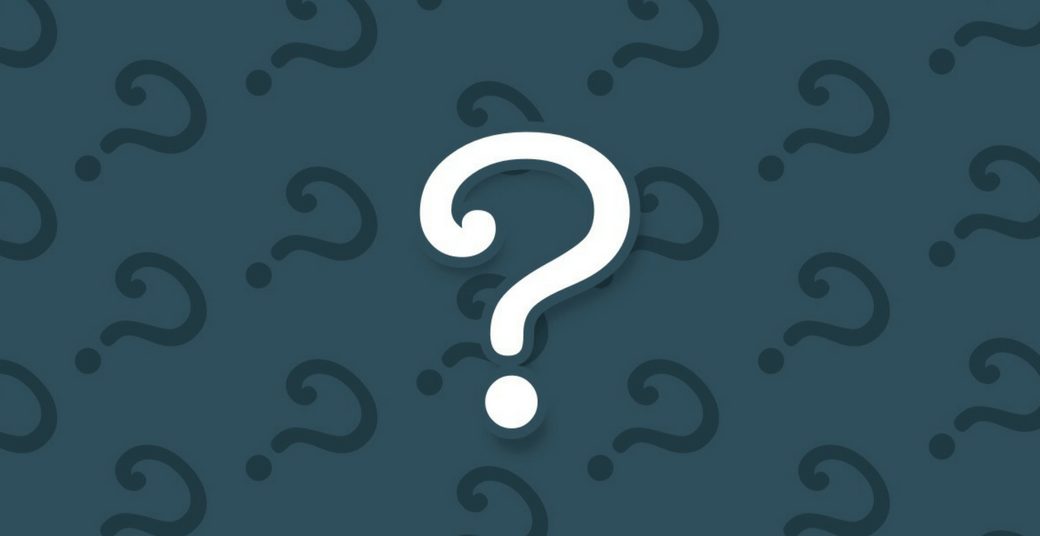
"The reader should be looking for an answer," says Nathan Connolly , an editor and the directing publisher of Dead Ink Books.
"The opening to your novel should be a question that can only be answered by reading on. This doesn't need to be literal, or overt, it can even be poetic, or abstract, but there must be a wound that can only be healed by reading on."
Example: The Bell Jar, Sylvia Plath
While the first line of Plath's only novel doesn't end with a question mark, it certainly poses a few mysteries.
It was a queer, sultry summer, the summer they electrocuted the Rosenbergs, and I didn't know what I was doing in New York.
What was queer and sultry about this summer? How does the narrator's story relate to the execution of Julius and Ethel Rosenberg? And does she actually not know why she's in the Big Apple? The only way to find out is to read on...

Write. Edit. Format. All for free.
Sign up to use Reedsy's acclaimed book-writing app for free
Learn how Reedsy can help you craft a beautiful book.
And speaking of unanswered questions, the next tip digs deeper into this idea of intriguing openings.
For in the experience of editor Britanie Wilson , the most successful beginnings have the magnetic effect of appealing to an emotion that all readers possess: curiosity.
"Make them immediately ask of your characters: What is this place? Why are they here? What are they doing? Who is involved? Where is this going?
"If you can pique your readers' curiosity from the very first sentence, you can will them to keep reading before they even know they like your book."
Example: "Royal Beatings", Alice Munro
The first story in Munro's 1978 short story collection, Who Do You Think You Are? gives its readers an unusual phrase that instantly piques their curiosity.
Royal Beating. That was Flo's promise. You are going to get one Royal Beating.
As with the Orwell opening, the reader is presented with an unusual turn of phrase repeated several times — including in the title. By the time we're just 15-words deep into the story, we have a burning question: what is a Royal Beating?
While creating curiosity and mystery is powerful, it's important that the start of your book isn't entirely cryptic . Your opening must sustain your readers' interest in some way if you are to keep them reading through to chapter two, and reveal more and more information in the plot points to come .
Pro tip: Starting your writing with dialogue is considered a no-no by some, but can actually be a great way of achieving this effect.
"To give readers the confidence to continue reading a story they've just started, it's important to give them enough detail to know where and when a story takes place," says author and ghostwriter Tom Bromley .
"Sometimes when stories begin, there's a danger that the scenes are a little bit 'floating' — where the reader isn't given enough information to visualize what's going on. Details of location and time, when provided with enough specificity, will ground the reader and make them feel secure."
Example: The Corrections , Jonathan Franzen
This novel, set in the American Midwest, opens by instantly grounding the reader in visuals related to the when and where of the story.
The madness of an autumn prairie cold front coming through. You could feel it: something terrible was going to happen. The sun low in the sky, a minor light, a cooling star. Gust after gust of disorder. Trees restless, temperatures falling, the whole northern religion of things coming to an end. No children in the yards here. Shadows lengthened on yellowing zoysia. Red oaks and pin oaks and swamp white oaks rained acorns on houses with no mortgage. Storm windows shuddered in the empty bedrooms. And the drone and hiccup of a clothes dryer, the nasal contention of a leaf blower, the ripening of local apples in a paper bag, the smell of the gasoline with which Alfred Lambert had cleaned the paintbrush from his morning painting of the wicker love seat.
If you were to think of this opening scene in a cinematic sense, it reads like a slow montage that cuts between different images that set up the tone and atmosphere of the piece. Note how the first sentence describes the wind — a classic piece of literary imagery that almost always signifies the same thing: that change is a'coming.
Avoiding clichés is something that should always be avoided. And in the experience of Thalia Suzuma , and editor who has worked with authors ranging from David Baldacci to Ken Follett, clichés can be avoided with some simple, unusual choices:
"Consider these two lines:
1) I'm sitting writing this at my desk.
2) I write this sitting in the kitchen sink.
"Which line makes you want to read on? I'd hazard a guess that it's probably the sentence about being perched at a sink — the opening line to one of my favorite novels, I Capture the Castle by Dodie Smith.
"Say something in your first few sentences that hasn't often been said before! A brief line laden with foreboding and heavy with what has not been said often works well, too."
Example: Jane Eyre , Charlotte Brontë
Opening a book by talking about the weather is just about as clichéd as things come. ( It was a dark and stormy night... ) But in the opening paragraph of Jane Eyre, we are presented with an image of cold weather — but filtered through the eyes of its title character.
There was no possibility of taking a walk that day.
More importantly than discovering the weather in chapter one, we learn something about the narrator: that she is a woman of absolutes.
Again, the weather is used to create a sense of foreboding — a perfect segue into our next tip.
Openings should be intense, but for editor Rebecca Heyman , that doesn’t necessarily mean loud or explosive .
"So many authors are keen to start with a literal bang — something going up in flames, or a car accident, or some other catastrophe. But recall that even a smoldering fire can burn your hand; draw us in like moths to the flame, but don’t let the bonfire rage so fierce we can’t get close."
Example: All The Light We Cannot See, Anthony Doerr
Remember what we said about winds signifying change? In the opening chapter of Anthony Doerr's novel set around the Second World War, we open with a description of the wind, bringing with it a literal message of change:
At dusk they pour from the sky. They blow across the ramparts, turn cartwheels over rooftops, flutter into the ravines between houses. Entire streets swirl with them, flashing white against the cobbles. Urgent message to the inhabitants of this town, they say. Depart immediately to open country.
This image we're presented with is almost playful (turning cartwheels, fluttering into ravines), making the message the pamphlets bear even more insidious.
For the final tip of this post, we give you what is perhaps the cardinal rule of starting a story...
You want your reader to be swept up in the story— for its entirety, but especially at the beginning, says editor Anne McPeak:
"This is your chance to intoxicate your reader and convince them that they can’t not read on. This doesn’t mean your story needs drama, or fireworks, or shocking material; what your story really needs is close attention to language, tone, and pacing.
"Dazzle your reader from the start, and they will willingly take your hand for the ride."
Example: Fortress of Solitude , Jonathan Lethem
Centering on the lives of two friends in Brooklyn and spanning decades, Lethem's novel opens with an everyday image — of girls rollerskating on the sidewalk — and filters it through the eyes of a narrator, who interprets the scene in quite an arresting fashion that's bound to capture the reader's attention:
Like a match struck in a darkened room:
Two white girls in flannel nightgowns and red vinyl roller skates with white laces, tracing tentative circles on a cracked blue slate sidewalk at seven o'clock on an evening in July.
The girls murmured rhymes, were murmured rhymes, their gauzy, sky-pink hair streaming like it had never once been cut.
Establishing best practices for starting a story can be tricky because, as Nathan Connolly says, “Fiction should, by nature, seek to defy, redefine or expand beyond rules." It should not be an author’s goal to emulate the words or tastes of another person while writing a novel.
However, many well-loved novels share a thread of commonality when it comes to their first few lines — such as a question, a brief to-the-point line, or in the middle of action. While there’s no hard rule for what works, these are guidelines you can follow when determining how to hook readers down your story’s path.
26 responses
Paynes says:
04/01/2017 – 21:13
"Years ago, down in the Amazon, Santiago set me up. He said, 'Lives are stories told over and over. The good ones keep getting better. Think about that, Daniel. And while you're at it, think about thinking. We learn best by thinking, just as fish breathe by drinking.' He said this very matter-of-factly. Then he asked me, 'Don't they?' He asked me this when he was about to die." "Santiago and the Drinking Party" by Clay Morgan That's one of my favorite beginnings.
↪️ Reedsy replied:
09/01/2017 – 16:48
This is really great because I actually did sit and think for a few moments about the line "lives are stories told over and over." So mission accomplished! Thanks for the contribution, Paynes!
Nathan Van Coops says:
06/01/2017 – 14:26
"There was a boy called Eustace Clarence Scrubb, and he almost deserved it." --C.S. Lewis- The Voyage of the Dawn Treader.
06/01/2017 – 14:36
Haha, that's a good one, Nathan!
Tripehound says:
07/01/2017 – 12:33
The Dodie Smith sentence - she's not sitting at the sink. She's sitting in the sink.
07/01/2017 – 16:56
Ah, good catch, thanks! We've edited accordingly.
RanaShubair says:
07/01/2017 – 16:16
The ideas are great. I find number 1 and number 9 most appealing to me. And thanks for the book examples you included- this helped me look them up and put them on my reading list.
07/01/2017 – 16:57
Glad you like it, Rana!
Carol Pearson says:
08/01/2017 – 20:01
"There are gods in Alabama: Jack Daniel's, high school quarterbacks, trucks, big tits, and also Jesus. I left one back there myself, back in Possett. I kicked it under the kudzu and left it to the roaches." Gods in Alabama by Joshilyn Jackson. Stunning.
09/01/2017 – 16:45
That is definitely unique — it's not "once upon a time", that's for sure :) Thanks for the comment Carol!
↪️ Carol Pearson replied:
09/01/2017 – 17:14
ha! no indeed. And the book delivered, too. Compelling from start to finish. Great read!
Rock Higgins says:
17/01/2017 – 17:08
"I am doomed to remember a boy with a wrecked voice – not because of his voice, or because he was the smallest person I ever knew, or even because he was the instrument of my mother’s death, but because he is the reason I believe in God; I am a Christian because of Owen Meany." John Irving, A Prayer for Owen Meany It is the whole 600+ page novel in a sentence, that takes 600+ pages to unpack.
17/01/2017 – 17:18
Wow, great one, Rock! You know an author really knows their story when they're able to condense 600 pages of it into a single sentence. Thanks for the quote :)
polfilmblog says:
24/02/2017 – 22:08
Venomous python? Really? "with this great python spitting its venomous kerosene upon the world," The only thing I get from this opening is that the author royally fucked it up. Pythons are constrictors of course. Most everyone knows that.
↪️ Elizabeth replied:
19/11/2019 – 08:01
Well, shoot! And Mr. Bradbury seemed to have such promise. I'm sure if he was still among the living you could teach him a thing or two. About snakes, anyway.
Dennis Fleming says:
24/07/2017 – 21:52
"Not wanting to arouse Vishnu in case he hadn't died yet, Mrs. Asrani tiptoed down to the third step above the landing on which he lived, teakettle in hand." The Death of Vishnu by Manil Suri
Astoria Eincaster says:
17/10/2017 – 19:57
I don't see anything strange and unexpected with 1984's opening sentence. Thirteen o'clock is basically 1 pm. In Europe the clock goes from 0 to 23. So 1:15 pm for example will be 13:15, 3:45 pm will be 15:45, while 4 am would be simply 4 o'clock. I don't know about other continents, but I'm sure about Europe, as I live there. And where does 1984 take part? In London, you ignorant Americans! Just stop citing 1984 as an example of an unexpected opening. Seriously, this is not the first post about types of book openings where I see 1984 mentioned. Its first sentence is not and it wasn't supposed to be strange, although some ignorant hacks still think it is.
17/10/2017 – 20:06
Analog clocks do not generally include the number "13." So while it is not strange for it to be thirteen o'clock, it remains a strange image for the hand of a clock to "strike thirteen," and I don't believe anyone aside from George Orwell ever said or wrote "the clock strikes thirteen." In 1984, the clock "strikes thirteen", as we can later surmise, because this is a military state and they use military time. So this opening is not only unexpected, it sets the mood for the rest of the book. Ah, and most of Reedsy's team is based in Europe, by the way, so the "ignorant American" argument doesn't really stand with us — sorry!
↪️ 4kidsandacat replied:
24/07/2018 – 11:09
Keep in mind, Orwell wrote this story in 1948, long before digital clocks were in common use. Thirteen o'clock doesn't sound strange today, but it may well have at the time.
↪️ Doug McNett replied:
19/04/2020 – 13:32
I completely agree with you. I am American, but when I first read those lines I thought nothing of it as to me they were referring to military time,
Diane Callahan says:
30/01/2018 – 16:11
Loved this article! I found it through your Novel Revision course. I'm pleased to see that your editors picked many of the same first lines I discussed in my YouTube video on the topic: https://www.youtube.com/watch?v=bm9trk8xRpg&t=2s Patrick Ness’s "The Knife of Never Letting Go" hooked me right away by opening with a strong narrative voice and humor: “The first thing you find out when yer dog learns to talk is that dogs don’t got nothing much to say.”
Evelyn Sinclair says:
11/03/2018 – 16:42
"Master was a little crazy: he had spent too many years reding books overseas, talked to himself in his office,did not always return greetings and had too much hair." Opening sentence from 'Half a Yellow Sun' definitely hooked me in to this story.
Candace says:
03/08/2019 – 01:56
Yeah. I know. You guys are going to read about how I died in agony, and you're going to be like, "Wow! That sounds cool, Magnus! Can I die in agony too?" - Magnus Chase and the Gods of Asgard: The Sword of Summer by Rick Riordan One of my favorite opening lines of all time.
↪️ Yvonne replied:
08/08/2019 – 02:01
That is indeed an awesome line! Thanks so much for the quote (and the book rec).
Alice says:
19/09/2019 – 19:20
My favorite line is from Charles Dickens "a Tale of two Cities" It was the best of times, it was the worst of times.
Elizabeth says:
19/11/2019 – 08:18
“We were somewhere around Barstow on the edge of the desert when the drugs began to take hold.” "Fear and Loathing in Las Vegas" by Hunter S Thompson. Okay, technically it's a classic HST hybrid - part semi-autobiography and part novel. But still one of the greatest beginnings I've ever had the pleasure of reading.
Comments are currently closed.
Continue reading
Recommended posts from the Reedsy Blog

450+ Powerful Adjectives to Describe a Person (With Examples)
Want a handy list to help you bring your characters to life? Discover words that describe physical attributes, dispositions, and emotions.
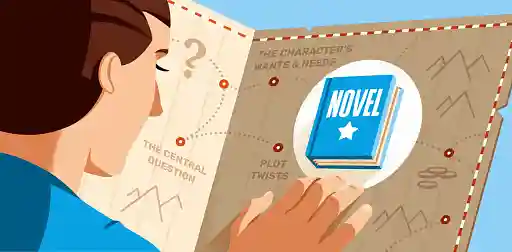
How to Plot a Novel Like a NYT Bestselling Author
Need to plot your novel? Follow these 7 steps from New York Times bestselling author Caroline Leavitt.
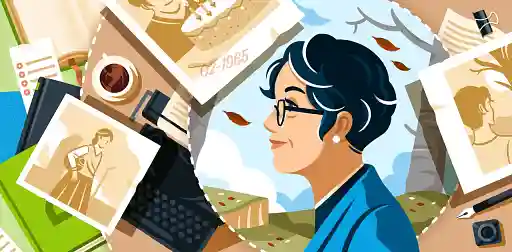
How to Write an Autobiography: The Story of Your Life
Want to write your autobiography but aren’t sure where to start? This step-by-step guide will take you from opening lines to publishing it for everyone to read.

What is the Climax of a Story? Examples & Tips
The climax is perhaps a story's most crucial moment, but many writers struggle to stick the landing. Let's see what makes for a great story climax.

What is Tone in Literature? Definition & Examples
We show you, with supporting examples, how tone in literature influences readers' emotions and perceptions of a text.

Writing Cozy Mysteries: 7 Essential Tips & Tropes
We show you how to write a compelling cozy mystery with advice from published authors and supporting examples from literature.
Join a community of over 1 million authors
Reedsy is more than just a blog. Become a member today to discover how we can help you publish a beautiful book.
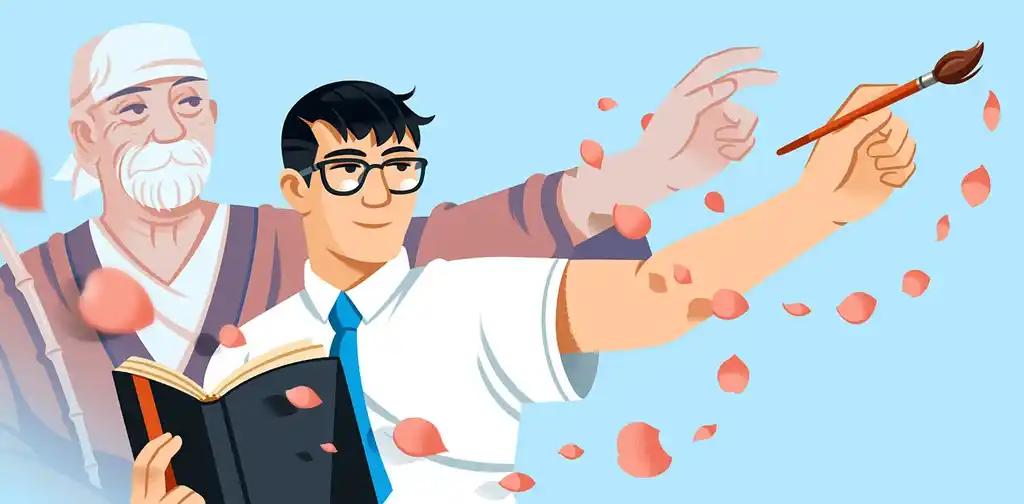
Looking for a book coach?
Sign up to meet vetted book coaches who can help you turn your book idea into a reality.

1 million authors trust the professionals on Reedsy. Come meet them.
Enter your email or get started with a social account:

First Line Generator: 101 Sentences To Get You Started Writing
Sometimes, the muse speaks through creative writing prompts .
And sometimes all you need is a single sentence to get you started on your next epic story .
Among the one sentence prompts you’ll find below, you’re sure to find at least one first line generator for a story you’ll love writing.
So, whether you’ve got a first name already picked out for your next main character or you’re starting with nothing but the will to write, enjoy the prompts below.
- List of 101 First Line Generator Ideas
The best way to use a sentence generator is to start free-writing on the first one that grabs your interest and write as quickly as you can.
This is not the time to edit. Let the words flow out as the story forms in your mind.
Short Story First Line Generator
Fantasy first line generator, random first line generator, poetry first line generator, novel first line generator, historical fiction first line generator, first line generator tools .
Enjoy these first line generator ideas for writing a short story .
1. With his background and fierce appearance, no one expected Bruno the mastiff to be a good dog for small children.
2. She frowned thoughtfully at the tarot cards arranged before her.
3. Writing down her thoughts about their relationship wasn’t as cathartic as she’d hoped.
4. She bent down to pick up what she thought was a half-buried seashell.
5. No one suspected that every one of the vaccine syringes sent to those areas would render their receivers sterile for life.
6. It was there the billionaires of the world gathered to announce their joint decision, either oblivious or indifferent to the revolution brewing next door.
7. Just when she thought she’d finished crying, the phone rang.
8. On a night like this, the sky should be full of stars, but as she looked up, her legs almost gave out.
9. She’d forgiven everyone and emptied her home of all that gave it meaning.

10. Three times, now, she’d almost died, and no one had noticed.
11. Her fifteen-month-old son tensed up in his shopping cart seat when the man approached.
12. “Oh, spare me the theatrics, and go cry somewhere else,” he said, adding, “No one wants to see that.”
13. Her voice broke over the phone when mine did, but she said, “It’s actually pretty nice here.”
14. “Okay, before I tell you, mom, you have to promise not to be mad.”
15. If they don’t find Ben attractive, they at least find him compelling. That’s the problem.
16. Once she catches your scent — a scent like yours, especially — she learns everything about you.
17. “I need something to look forward to that doesn’t come in a bottle. You got any ideas?”
18. It was his living room art display that finally convinced her to leave him.
When you’re writing your next page-turning fantasy novel , a good first line can get the creative ideas flowing.
Use these as a springboard, even if you end up changing the first line in your final draft.
19. This world was never meant to survive her.
20. As far as she was concerned, he was a typical teenager with a hoodie.
21. It’s not every girl who finds out her mom is a centuries-old superhero.
22. My first tutor was a dragon with a terrible sense of humor.
23. I looked into the crystal ball and saw myself walking hand-in-hand with my mortal enemy.
24. What I made for my mother’s birthday was supposed to be a harmless pendant.
25. I spent a thousand years in that bottle before a child freed me from it and called me “Mama.”
26. He made it sound as though the very worst thing I could be was a witch.
27. She was changed into something else while her parents stood nearby, watching the others.

28. The label on the bottle said “Drink me,” and Alice rolled her eyes and snickered as she poured herself a glass.
29. The freeway was completely deserted, and the only words on the marquee near my exit were “Supplies have run out, and shelters are full.”
30. She told me I was the perfect candidate for their weaponized shifter program; and their target was someone easy to dislike.
31. I knew she’d been scratched during the attack, but until now, full moons hadn’t been a problem.
32. He shouldn’t have made me choose between my world and this one.
33. The one thing my mother hadn’t told me about her past was the reason I now lived in an icy cave near the top of the highest peak.
34. The trolls in that valley are the ones who found me and gave me my name.
35. I’m unusually tall for a dwarf. My mother was not prepared.
Don’t underestimate the creative power of random thoughts from memories or recent experiences.
Use one of the following to launch into a story that weaves elements of your own or someone else’s history into it.
36. If only she hadn’t bought the red one.
37. One bite, and his eyes closed, his focus turned inward, while she quietly exhaled.
38. She was the kind of person who loudly insulted others’ intelligence while neglecting her own.
39. Doctors told her she could never diet again.
40. I don’t sleep with that stone unless I want to wake up feeling as though I spent the whole night running.
41. It was enough for her that he’d found a lost child and returned him to his parents.
42. You’d think a winning lottery ticket was just what we needed.
43. In exchange for the apartment, she had agreed to bring the inmate his meals.
44. Her father always said driving would be the death of her.
45. What if I told you the separation of church and state is an illusion?
46. The largest golden maple leaf I’d ever seen landed at my feet as I turned the corner.
47. “Help me! I’m not your enemy,” he said.
48. For some reason, no one thought to question the other housekeeping staff.
49. As soon as he stepped across the threshold, she caught a whiff of something.
50. Even with a baby in her arms and her hair loose, I knew her. And it all came back.
51. He waited, nervously clearing his throat until my husband left the room.
52. His bike still hung on the rack, covered in dust, and one wheel bent into a moon shape.
Sometimes, all you want to write is a poem to express the ideas circulating in your mind.
Use any of the following to open the spigot and let the uncensored words out onto the page. Editing can wait.
53. The sky feels as empty as my chest.
54. The trees would miss you if you left.
55. The sunlight brought me back to you.
56. I was tired before my first sip of wine.
57. Memory is all around us, as well as within.
58. Don’t tell me what I need.

59. No expensive funeral for me, if I even have one.
60. The first step toward you was the hardest.
61. My hope literally took form inside of me.
62. I fight for what you’ve had from birth.
63. I come to shatter this fortress— not protect it.
64. You were born to make mistakes and to change the world as you learned from them.
65. The burn is what gets me.
66. There’s something in the water that now lives in me.
67. Why should I get away with it?
68. One bloom outlasted the rest before suddenly dropping.
69. I wish I could tell you this has nothing to do with me
More Related Articles:
12 Effective Tips On How To Write Faster
How to Start Writing By Creating the Daily Writing Habit
12 Of The Best Writing Websites To Inspire You To Write
70. I know how he sees me; the alcohol helps with that. But it doesn’t argue with him.
71. Every answer to my question begins with, “Now, don’t take this the wrong way…”
72. No one expected her to be the first among them to succumb.
73. I could barely look at it. The sticky note attached to the jar read, “Careful. It’s loaded.”
74. She saw me and sneered. “I thought maybe your lawn mower was broken.”
75. He prided himself on understanding criminals. This one, with his glassy eyes and unerasable smirk, was the first to humble him.
76. This was the seventh parcel to arrive for her with nothing for a return address but a dried blossom under a square of packing tape.
77. She’d spend hours in the shop, looking over different stones, holding them briefly in her hand — until she found one that didn’t want to leave her fingers.

78. The baby’s name was Petra before the neighborhood prophet said something disconcerting to her father.
79. Her first love lay on the table in a neat, familiar arrangement, while her second love waited for her to come read them.
80. My mother makes the only perfectly balanced and seasoned vinaigrette I’ve ever tasted.
81. The party went splendidly until Meredith’s blood splattered on my favorite pillow.
82. He doesn’t think I know where he hid the evidence from that night.
83. He quietly rolled the car back down the driveway and into the street before pausing for one last look at my bedroom window.
84. The first time I remember him looking at me with anything like pride was when I screamed in his face.
85. “Get that lazy eye back where it’s s’posed to be. You’ll scare the cats.”
86. She knew Rasputin was in love with her. That’s what made it so easy.
87. Everyone assumed Jack the Ripper was a man. It was the perfect cover for the family business.
88. Custer graduated at the bottom of his class at West Point. There was a reason.
89. We had an understanding, Jefferson and I. He promised me freedom for my unborn children.
90. “I’d just stepped out of Ford’s for a drink during intermission. Booth was drinking in the same saloon. And then he wasn’t.”
91. “Now that I’m a mother, my position at court has finally improved. Just as well no one’s asked me who the father is.” (Marie Antoinette)
92. “She called me cousin and friend after the murder of my husband.” (Mary Queen of Scots)
93. “Sixteen was too young to get married — especially to a man I’d only just met. But it beat going back to an orphanage.” (Norma Jean Baker / Marilyn Monroe)

94. “It’s not every actor who gets to be on Hitler’s death list. Too bad for him my job would probably kill me first.” (Curly Howard)
95. “The real Vladimir died a long time ago.” (Putin’s wife + conspiracy theories)
96. “It’s true my husband’s death was tragic. It’s also true that it was necessary.” (Catherine the Great of Russia)
97. “It’s thanks to my slave, James Hemmings, that the American people now have macaroni and cheese, French fries, and crème brûlée.” (Jefferson)
98. “We watched the boat sink with the rest, huddled together in our lifeboat. There were four of us left. ” (lone survivor of the SS David J Morell)
99. “We stumbled upon 11 of them, mostly kids. They were in bad shape — frostbitten, bleeding, and barely able to walk.” (John Stark, unpaid rescuer of the Donner Party)
100. “I invested $1.5 million of my own money in ‘The Great Dictator’ when the U.S. and Nazi Germany were still at peace.” (Charlie Chaplin)
101. “I’ve had relationships with both men and women. One of them, poor John, I left at the altar.” (Greta Garbo)
If the prompts above got your mind working, but you could still use a bit more help, try any of the following first-line generators. True, they don’t know anything about the story you’re writing , but they don’t have to. Sometimes, all you need is a scrap of an idea.
First Line Generator at WritersDenPantomimepony.co.uk
Click on the giant blue button, and this generator will give you an opening line inspired by careful analysis of classic openers. The secret to writing a compelling opener is creating a story within a single line. And that’s something the makers of this generator understand.
Keep clicking until one of the options gets you thinking. Then brainstorm as many follow-up ideas as you can.
Opening Line Generator at Plot-Generator.org.uk
This generator gives you ten opening line ideas right away. Below them, you can select the number of new opening lines or ask them to suggest a number. Click on “Write me an opening line” to generate as many or as few openers as you like.
On the left, you’ll see their “Top 10 Generators,” including “Character Name” and “Rap Lyrics.” On the right, you’ll see “Newest Generators,” including “Pirate Name” and “Coronavirus Activity.”
Random First Line Generator at WritingExercises.co.uk
The Writing Exercsies website has a wide selection of content generators, including this one for random first lines. You can also find a rhyming dictionary (in case you prefer traditional, rhyming poetry), as well as generators for plots and random bits of dialogue .
Click on “Generate a First Line” as many times as necessary to find something you can use to get started.
If you had to choose one first line generator from the selection in this post, which ones spoke to you the loudest?
Or have you already started writing something that has you brimming with creative energy and excitement?
If this will be a long story , remember to do yourself a favor and stop for the day when you still want to keep going.
When you already have an idea of what happens next, sitting back down to it is much easier.
May the words keep flowing. And may at least one of these writing prompts set you on the path to writing something you and your readers will love.
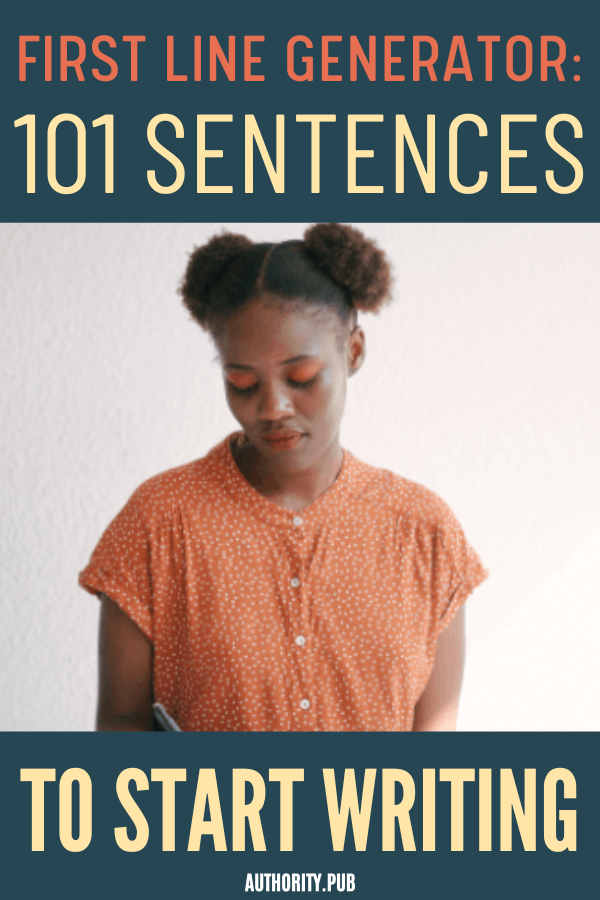
Leave a Comment Cancel reply
This site uses Akismet to reduce spam. Learn how your comment data is processed .
How to Start a Story: 10 Ways to Get Your Story Off to a Great Start
by Joslyn Chase | 0 comments
Perhaps you’ve heard the old publishing proverb: The first page sells the book; the last page sells the next book. I’m convinced there’s a mammoth grain of truth in that. The beginning and the end of any story are critical elements that you really want to nail. Today, we’re going to focus on how to start a story—in other words, how you can craft a spectacular beginning that will hold readers spellbound and get them to turn that first all-important page.
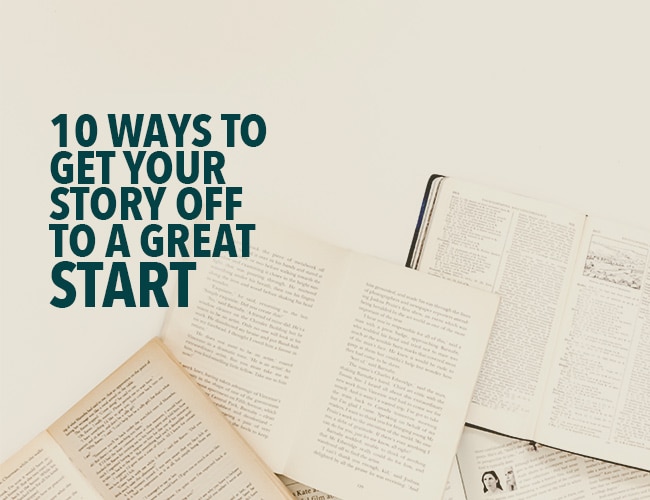
Whether you’re pitching to an agent, a publisher, or direct to the reader, your opening lines form the basis for how they’ll judge the rest of your story. You have about a sixty-second window of influence before that initial judgment solidifies. It follows that this is a good place to invest your time and effort.
Granted, a compelling opening is not an easy task to accomplish. Besides grabbing the reader's attention, you want to ground readers in a setting, establish voice, hint at theme, and introduce a protagonist readers can get behind. To do this, you need to answer specific questions for your reader, while at the same time planting others.
Story Revolves Around Questions
Cultivating questions for your reader is what keeps them turning the pages, but you’ll lose them if you don’t provide answers, as well. If you want your reader to commit to your story, it’s best to establish a few essentials right up front.
- Whose story is it? You’re asking your reader to spend serious time with your protagonist. They’ll want to know who they’ll be rooting for.
- What kind of story is it? Readers go into a book looking for a particular type of reading experience and you need to let them know they’ve come to the right place.
- When and where is the story happening? Setting is hugely important to selling your reader. I did a workshop with top editor Kristine Kathryn Rusch, and one of the most frequent critiques she gave writers was: “There’s no setting. You lost me on setting.”
- What’s the story behind the story? When readers think story, they think plot . Writers know the real story is internal—not what happens, but how those events affect the characters. While you won’t necessarily lay your hero open on the first page of your story, hinting at his internal struggle gets the reader on his side.
- Why should the reader care? The most glorious descriptions or action-packed drama won’t hook your reader if you don’t give them a reason to care about your character. Answering the four questions above will help do this, but you’ll need to give more.
10 Compelling Ways to Start a Story
You’ve got to command reader attention and answer some important questions, but what does that look like on the page? How do you structure your opening to accomplish those objectives?
Have you heard of modeling? Life coaches and success gurus talk about it a lot. It involves finding someone who’s wildly effective at doing what you want to do and studying their methods to duplicate their success. If in doubt, go to the opening pages of bestselling books in your chosen genre and see how the masters did it.
Beyond that, there are so many ways to go. Here are ten ways to start a story you might consider:
1. Strong Voice
Example: “Mae Mobley was born on a early Sunday morning in August 1960. A church baby we like to call it. Taking care a white babies, that’s what I do, along with all the cooking and the cleaning. I done raised seventeen kids in my lifetime. I know how to get them babies to sleep, stop crying, and go in the toilet bowl before they mamas even get out a bed in the morning.” The Help, Kathryn Stockett
Example: “I smiled when I saw the dead girl. Just for a moment. Reflex, I suppose.” The Snow Angel, Doug Allyn
2. Relevant Anecdote
Example: “When Ella Brady was six she went to Quentins. It was the first time anyone had called her Madam. A woman in a black dress with a lace collar had led them to the table. She had settled Ella’s parents in and then held out a chair for the six-year-old. ‘You might like to sit here, Madam, it will give you a full view of everything,’ she said. Ella was delighted.” Quentins, Maeve Binchy
Example: “I hope this video camera works. Anyway, this (click) is a blowup of a model’s eye, the bluest I’ve ever seen. The only other time I remember seeing that exact color of blue was the day my sister Nicole drowned. It was everwhere: in the water, in the sky, Nicole’s skin. Blue, I remember, and coughing.” Forgetting The Girl, Peter Moore Smith
3. Intriguing Mystery
Example: “Who am I? And how, I wonder, will this story end?” The Notebook, Nicholas Sparks
Example: “People’s lives—their real lives, as opposed to their simple physical existences—begin at different times. The real life of Thad Beaumont, a young boy who was born and raised in the Ridgeway section of Bergenfield, New Jersey, began in 1960. Two things happened to him that year. The first shaped his life; the second almost ended it.” The Dark Half, Stephen King
4. Uneasy Suspense
Example: “The smell of newly rotting flesh hit Jakaya Makinda. He stopped his Land Rover, grabbed his binoculars off the seat beside him, and trained them in the direction of the odor’s source.” Death in the Serengeti , David H. Hendrickson
I used this as an example of Uneasy Suspense, but Hendrickson kicked it off with a startling first sentence and infused it with setting, layering the effect.
Example: “Water gushed out of the corroded faucet into the chipped, porcelain tub, pooling at the bottom with a few tangled strands of long, brown hair. The water was easily 120 degrees. So hot that Katelyn Berkley could hardly stand to dip her painted green toenails into it. The scalding water instantly turned her pale skin mottled shades of crimson.” Envy, Gregg Olsen
5. Stirring Theme
Example: “I became what I am today at the age of twelve, on a frigid overcast day in the winter of 1975. I remember the precise moment, crouching behind a crumbling mud wall, peeking into the alley near the frozen creek. That was a long time ago, but it’s wrong what they say about the past, I’ve learned, about how you can bury it. Because the past claws its way out.” The Kite Runner, Khaled Hosseini
I used this excerpt as an example of stirring theme, but it is bursting with other elements and could be placed under setting, suspense, voice, character, world tilting off-center, and an enthralling first sentence.
Example: “Sometimes it’s overwhelming: the burden of knowing that the man you most admire isn’t real. Then the depression that you’ve fought all your life creeps in, the anxiety. The borders of your life contract, stifling, suffocating.” The Adventure of the Laughing Fisherman, Jeffery Deaver
This one’s got a pretty kicking first sentence, too.
6. Dynamic Setting
Example: “Out of a cloudless sky on a windless November day came a sudden shadow that swooped across the bright aqua Corvette. Tommy Phan was standing beside the car, in pleasantly warm autumn sunshine, holding out his hand to accept the keys from Jim Shine, the salesman, when the fleeting shade touched him. He heard a brief thrumming like frantic wings. Glancing up, he expected to glimpse a sea gull, but not a single bird was in sight.” Tick Tock, Dean Koontz
This is also a nice instance of uneasy suspense.
Example: “They were parked on Union, in front of her place, their knees locked in conference around the stick shift, Janna and Justin talking, necking a little, the windows just beginning to steam.” Shared Room on Union, Steven Heighton
7. Quirky or Startling Opening Sentence
Example: “The world had teeth and it could bite you with them anytime it wanted.” The Girl Who Loved Tom Gordon, Stephen King
Example: “As soon as he stepped into the dim apartment he knew he was dead.” Garden of Beasts, Jeffery Deaver
Both of these examples also instill suspense, as they suggest danger and leave the reader anxious to find out more.
8. Compelling Character
Example: “First the colors. Then the humans. That’s usually how I see things. Or at least, how I try.” The Book Thief, Markus Zusak
What kind of character is this you ask yourself, compelled to go on.
Example: “Everyone knows this kid. He is dirty and dumb and sits in a corner, lonely, but not alone. His face has an involuntary twitch, and when he makes eye contact, his lids and cheeks squeeze his eyes shut. We call him Blinky. Blinky rolls with it, though, smiles big and toothy when kids shout his name across the schoolyard.” A Bottle of Scotch and a Sharp Buck Knife, Scott Grand
I chose this for character, but it’s got a big dose of voice in it, as well.
9. Tilting World
Example: “The ravens were the first sign. As the horse-drawn wagon traveled down the rutted track between rolling fields of barley, a flock of ravens rose up in a black wash. They hurled themselves into the blue of the morning and swept high in a panicked rout, but this was more than the usual startled flight. The ravens wheeled and swooped, tumbled and flapped. Over the road, they crashed into each other and rained down out of the skies. Small bodies struck the road, breaking wing and beak. They twitched in ruts. Wings fluttered weakly. But most disturbing was the silence of it all.” The Doomsday Key, James Rollins
Is there any doubt the world in this story is twisting off its axis?
Example: “On the afternoon I met my new neighbor, a woman others in the cul-de-sac would dub ‘Ramba,’ I wasn’t looking for trouble. In fact, I wasn’t looking for anything other than to enter my first full month of retirement with a small military pension and dreams of a hop to Florida or Hawaii once a year until my expiration date arrived.” Many Dogs Have Died Here, James Mathews
Nothing explicit occurs off the bat, but Mathews sets up for the punch. This poor sucker’s world is tilting.
10. Engaging Dialogue
Example: “'You look like crap, Pen.' Pendleton Rozier, my longtime mentor, opened the door wide, then coughed into the crook of his elbow. ‘If only I felt that good.’” Rule Number One, Alan Orloff
Example: “'Which is even weirder yet,’ Gowan said. ‘But that ain’t the best part.’ At approximately which point, Kramer didn’t want to hear any more. It had been a mistake to let Gowan get started. He went outside into the mild March evening to take a leak and get away from Gowan for a little while before hitting the sack. ‘Seriousy, I got the skinny on ‘em,’ Gowan said, unzipping and joining him at the edge of the porch.” Spring Rite, Tom Berdine
You’ll notice writing voice and character here, too.
Invest in a Great Beginning
Spending the time and effort to craft a superb opening for your story is a good investment. However, worrying over it can hold you up. If you’re spinning your wheels over how to start a story, just get something down and move on.
Then, when you’ve reached the end of your story and you have a better understanding of the theme, tone, and characters, you can go back and fine tune or start from scratch to design your perfect beginning.
Beautiful Bookends
In fact, doing so may afford you the opportunity to bookend your story with a beginning and ending that reflect on each other, enclosing your entire story in a nice, thematic package that’s very satisfying to readers.
For instance, my thriller novel Nocturne In Ashes opens with the protagonist, a concert pianist, bombing her comeback performance. Then at the end, after surviving a series of harrowing experiences and battling her inner flaw, she’s gained the confidence she needed and nails the Beethoven that was her downfall.
I’ve touched on some ideas to get you off to a great start, but there are many other types of openings to explore. If you’re having trouble, hit the library and see how others have done it. You’re sure to find something that works for your story. And have fun!
How about you? Do you struggle with how to start a story? What book openings have made an impression on you? Tell us about it in the comments .
Using one of the types of openings outlined above, write the beginning for a story idea you have in mind, or choose from one of these prompts:
Stella is nervous about meeting her ex-husband for dinner.
Darren takes his son on a hunting trip, determined to teach him how to be a man.
Cheryl wants to try out for the girls’ softball team, but the captain is her ex-best-friend.
Write for fifteen minutes and when you’re finished, post your work in the Pro Practice Workshop. And if you post, be sure to leave feedback for your fellow readers!
Joslyn Chase
Any day where she can send readers to the edge of their seats, prickling with suspense and chewing their fingernails to the nub, is a good day for Joslyn. Pick up her latest thriller, Steadman's Blind , an explosive read that will keep you turning pages to the end. No Rest: 14 Tales of Chilling Suspense , Joslyn's latest collection of short suspense, is available for free at joslynchase.com .
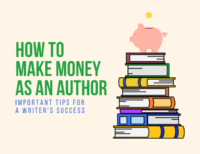
Trackbacks/Pingbacks
- Rejected Book: 3 Reasons Editors Reject Manuscripts - […] strong opening is critical to grabbing the editor’s attention and giving your story a hope of making the first…
Submit a Comment Cancel reply
Your email address will not be published. Required fields are marked *
Submit Comment
Join over 450,000 readers who are saying YES to practice. You’ll also get a free copy of our eBook 14 Prompts :
Popular Resources
Best Resources for Writers Book Writing Tips & Guides Creativity & Inspiration Tips Writing Prompts Grammar & Vocab Resources Best Book Writing Software ProWritingAid Review Writing Teacher Resources Publisher Rocket Review Scrivener Review Gifts for Writers
Books By Our Writers

You've got it! Just us where to send your guide.
Enter your email to get our free 10-step guide to becoming a writer.
You've got it! Just us where to send your book.
Enter your first name and email to get our free book, 14 Prompts.
Want to Get Published?
Enter your email to get our free interactive checklist to writing and publishing a book.
| writing prompts. This idea generator can be used by novelists, screenwriters, teachers, short story writers, and more. It has been used by writers of all ages. . by times!
|
Daily Writing Tips
20 great opening lines to inspire the start of your story.

As Glinda the Good Witch says in The Wizard of Oz , “It’s always best to start at the beginning.” That’s where editors and literary agents generally get going, so perhaps you should, too. Here are some strategies, accompanied by exemplars from literature, for making the first line of your novel or short story stand out so that the reader can’t help but go on to the second and the third and so on to see what else you have to say:
“‘Take my camel, dear,’ said my Aunt Dot, as she climbed down from this animal on her return from High Mass.” — Rose Macaulay, The Towers of Trebizond
Are you in the mood for amusement? This opening line makes it clear that farce is in force.
“The human race, to which so many of my readers belong, has been playing at children’s games from the beginning, and will probably do it till the end, which is a nuisance for the few people who grow up.” — G. K. Chesterton, The Napoleon of Notting Hill
Astute observations accompanied by a implied sigh of disgust are tricky to master, but Chesterton, one of the most multifaceted men of letters, lights the way for you with this sample of the form.
“The sky above the port was the color of television, tuned to a dead channel.” — William Gibson, Neuromancer
Oh, by the way, just in case you missed the forecast? Don’t expect any fluffy bunnies or fragrant blossoms or dulcet giggles to show up in this seminal cyberpunk story. A spot-on metaphor expresses the story’s nihilism, letting you know what you’re in for and lugubriously inviting you in.

4. Confiding
“There was a boy called Eustace Clarence Scrubb, and he almost deserved it.” — C. S. Lewis, The Voyage of the Dawn Treader
The author of the Chronicles of Narnia no sooner introduces by name a new character in the latest installment than, in just five more words, he succeeds in telling you everything you need to know about him. Well, got that out of the way.
“Justice? — You get justice in the next world, in this world you have the law.” — William Gaddis, A Frolic of His Own
Somebody got up on the wrong side of the bed this morning — and maybe the bed’s shoved up against the wall, and that attitude is a permanent condition. The stage is set for an unhappy beginning, middle, and ending.
6. Disorienting
“It was a bright cold day in April, and the clocks were striking thirteen.” — George Orwell, 1984
Ho-hum — huh? Orwell’s opening line creates a slight but immediate discordance that sets you up for an unsettling experience.
7. Enigmatic
“Once upon a time, there was a woman who discovered she had turned into the wrong person.” — Anne Tyler, Back When We Were Grownups
It will not surprise you to learn that the protagonist sets about retracing her steps and striving to correct the error, but after reading this subtle but striking first line, can you resist finding out how she does it?
8. Epigrammatic
“The past is a foreign country; they do things differently there.” — L. P. Hartley, The Go-Between
This offbeat observation from Hartley’s novel of painful reminiscence is a blindsidingly original statement that one will feel compelled to read about just how the writer acquired this wisdom.
9. Expository
“In our family, there was no clear line between religion and fly fishing. We lived at the junction of great trout rivers in Montana, and our father was a Presbyterian minister and a fly fisherman who tied his own flies and taught others. He told us about Christ’s disciples being fishermen, and we were left to assume, as my brother and I did, that all first-class fishermen on the Sea of Galilee were fly fishermen, and that John, the favorite, was a dry-fly fisherman.” — Norman McLean, A River Runs Through It
By the end of this paragraph, you already know a great deal about the narrator’s family (especially the father) — but thanks to the introduction, as clear as a snow-fed mountain river, you want to know more.
10. Foreboding
“I have never begun a novel with more misgiving.” — W. Somerset Maugham, The Razor’s Edge
The author is a bit intrusive here, true enough, but it is kind of him to let us know that we’re in for a bit of unpleasantness. But if he can express such profound reluctance, it must be quite a story.
“There was a desert wind blowing that night. It was one of those hot dry Santa Anas that come down through the mountain passes and curl your hair and make your nerves jump and your skin itch. On nights like that every booze party ends in a fight. Meek little wives feel the edge of the carving knife and study their husbands’ necks. Anything can happen. You can even get a full glass of beer at a cocktail lounge.” — Raymond Chandler, Red Wind
Chandler, the master of hard-bitten crime noir, makes it obvious that this story is not going to end well. You can almost hear the smoky, whiskey-soured, world-weary narration in your head. And this quote comes from one of Chandler’s half-forgotten short stories.
12. Inviting
“Whether I shall turn out to be the hero of my own life, or whether that station will be held by anybody else, these pages must show.” — Charles Dickens, David Copperfield
Dickens extends his arm toward the passageway within, welcoming you to enter what promises to be an entertaining story.
13. Picaresque
“In the last years of the Seventeenth Century there was to be found among the fops and fools of the London coffee-houses one rangy, gangling flitch called Ebenezer Cooke, more ambitious than talented, and yet more talented than prudent, who, like his friends-in-folly, all of whom were supposed to be educating at Oxford or Cambridge, had found the sound of Mother English more fun to game with than her sense to labor over, and so rather than applying himself to the pains of scholarship, had learned the knack of versifying, and ground out quires of couplets after the fashion of the day, afroth with Joves and Jupiters, aclang with jarring rhymes, and string-taut with similes stretched to the snapping-point.” — John Barth, The Sot-Weed Factor
Oh, but you know this novel is going to be juicy. This snide introduction to the main character conveys a promise of a continuous feed of schadenfreude.
“Ships at a distance have every man’s wish on board.” — Zora Neale Hurston, Their Eyes Were Watching God
Every once in a while there comes an opening line that seems to have an entire story folded up inside it. But it’s just the label on the envelope. And I challenge you to withstand the urge to open it up and read the message.
“We started dying before the snow, and like the snow, we continued to fall.” — Louise Erdrich, Tracks
A somber, stately metaphor draws us in despite the pervasively gloomy imagery.
16. Prefatory
“It was the best of times, it was the worst of times, it was the age of wisdom, it was the age of foolishness, it was the epoch of belief, it was the epoch of incredulity, it was the season of Light, it was the season of Darkness, it was the spring of hope, it was the winter of despair.” — Charles Dickens, A Tale of Two Cities
Many people associate Dickens with whimsy and eccentricity, but A Tale of Two Cities is a stern study of the insanity of mob rule, and this floridly eloquent prologue sets the stage like the presenter of a Shakespearean prologue: “Epic Ahead.”
17. Romantic
“He was born with a gift of laughter and a sense that the world was mad.” — Raphael Sabatini, Scaramouche
Romantic, that is, in the sense of lust for life, not love for another. This author of swashbucklers like The Sea Hawk and Captain Blood (and, of course, Scaramouche ) lets you know right away that you are about to meet someone larger than life.
18. Sarcastic
“It is a truth universally acknowledged, that a single man in possession of a good fortune, must be in want of a wife.” — Jane Austen, Pride and Prejudice
Austen didn’t invent the word snark — but she certainly refined the application of the quality. Notice, though, how subtle this line is. It’s a bon mot — understated, yet with teeth behind that prim smile.
“If you really want to hear about it, the first thing you’ll probably want to know is where I was born, and what my lousy childhood was like, and how my parents were occupied and all before they had me, and all that David Copperfield kind of crap, but I don’t feel like going into it, if you want to know the truth.” — J. D. Salinger, The Catcher in the Rye
Can you find it in your heart to forgive this young man his grievously bad attitude? More likely, you’ll be impressed by — and want to immerse yourself in more of — his insolence.
20. Unexpected
“Every summer Lin Kong returned to Goose Village to divorce his wife, Shuyu.” — Ha Jin, Waiting
This seemingly pedestrian introduction upends itself with an intriguing premise that raises a question in the reader’s mind that must be answered.
Stop making those embarrassing mistakes! Subscribe to Daily Writing Tips today!
You will improve your English in only 5 minutes per day, guaranteed!
Each newsletter contains a writing tip, word of the day, and exercise!
You'll also get three bonus ebooks completely free!

22 thoughts on “20 Great Opening Lines to Inspire the Start of Your Story”
Thank you for sharing these fabulous opening lines! I love Jane Austen — Pride and Prejudice is one of my favorite books.
Thanks for posting this list. It’s a lot of fun and a great way to start a writing day 🙂
Well I have to share my favourite opening lines now:
“It was the day my grandmother exploded!” – The Crow Road, Iain Banks
“I write this sitting in the kitchen sink” – I Capture the Castle, Dodie Smith
In fact the full opening from the Crow Road is even better:
“It was the day my grandmother exploded. I sat in the crematorium, listening to my Uncle Hamish quietly snoring in harmony to Bach’s Mass in B Minor, and I reflected that it always seemed to be death that drew me back to Gallanach.”
I’m simultaneously inspired and intimidated. I can hardly imagine writing anything that draws readers in the way these introductions do. Must keep practicing!
What a great list of opening lines!
4, 5, 12, 17 & 20 are my favorites.
Thank you for compiling this list. I thought a lot about my own style and strategies while reading it, and I’m pretty much all over the place. I do notice my tendency to start each book with dialogue, whether the style is sarcastic, foreboding, or bleak etc. Most often, the dialogue is pushed behind a beginning paragraph during edits, changing the feel of the opening.
Thanks for the great read, Allure Van Sanz
I will always love “Once upon a time, ” the best.
This is fabulous – thanks for sharing!
Phew! I’m glad I didn’t bypass this e-mail. By the title, I thought this article was going to offer 20 sentences that subscribers could expand upon.
I love the format this article is in, though. 🙂 I knew these different types of beginnings existed, just not consciously.
I like the openner which is something like this:
“Well unlike last time when I got too involved and gave you the run arround, this time I’m going straight for the jugular and cut out all that crap about my private life”.
of course he doesn’t.
The author is Don von Elsner.
Superb! This is a charming, outstanding and quite practical posting. These devices are such wonderful tools to be used to enchant readers, create flows, spark drama, awaken minds… and so much more.
Practice is key. What I deeply love about such tools is they may be applied to so many forms of writing such as fiction, poetry and most other types of narrative. Even “tweets”!
With “tweets” in mind I will have a least 20 new tweets to apply and practice these ideas on today. I am cheating here a wee bit.
Creating tweets for “bestdeedswords”, helps understand how to apply these tools and also selfishly carves them into the dark caverns of my eclectic memory facilities. This is a simple personal way to store them for later use.
Mark, these great posts are very useful. Thanks for your hard work and research. Thanks so very much.
Personally, I like the way I have started all my stories. I love getting right to the action, and explaining later or in different, unique ways. I am only 14 and on my 3rd story.
Great post! I’ve been testing out story ideas at the Creative Copy Challenge and received favorable feedback. I think it’s time for me to write a novel.
Well unless someones already done it I think it would be not only right but, satisfying to have endings as well.
That’s the subject I’ve been researching today – one spot of advice I read was to leave the first and last lines until the novel was complete – I think it’s a useful excuse for procrastinators like me.
Great post! I’ve read some of these books and never really gave any thought to the reason why. Now I know.
These are all good lines. Good lines are what matter, not their location in the book. Go back and look at your favorite literature. Most of mine begin with ordinary lines. The opening sentence and paragraph do not truly need to stand out. All the better if they do, but it is not necessary.
All seem to have missed Snoopy’s classic: “It was a dark and stormy night.” One of my favourites.
Although the lines are intriguing, and certainly I am appreciative of this post, I am more impressed by the one who compiled it. Your comments and labels were as educational to read as the quotes themselves. Thank you for sparing the time to educate us both with the wit of others and your own unique style of narration to spur us onward to the end.
The opening line of a book I read freshman year of high school still sticks with me. “When I was little I would think of ways to kill my daddy. I would figure out this or that way and run it down through my head until it got easy.” -Ellen Foster by Kaye Gibbons I still think that to this day that line motivated me to read the book in half an afternoon.
I’ve always enjoyed the (usually ignored, always contradicted) first line of “Gone With the Wind:”
‘Scarlett O’Hara was not beautiful… though her suitors rarely took notice of this when as enthralled by her charm as the Tarleton twins.’
I love this article! This was great!!! My favorites were 1, 5, and 6! I used something similar to 6 in my book! Too funny!!!
I made this one up: When I was overtaken by poisonous vines, I never thought I would grow wings.
And also this- The teacher said “if John has nine pancakes, and Adam gives him eighteen pencils, why are ant green?” I knew, of course, that the answer was horses have six legs, but I let a newer student get it wrong. “It’s because aliens don’t wear hats.” his words went up in pitch at the end, showing he was unsure. The teacher said,” try again, Mark.”
Leave a Comment
- How to write a story
- How to write a novel
- How to write poetry
- Dramatic writing
- How to write a memoir
- How to write a mystery
- Creative journaling
- Publishing advice
- Story starters
- Poetry prompts
- For teachers
Great Story Beginnings
Story beginnings are important, and in terms of getting published, they’re THE most important part of a story. On this page, you'll learn how to start a story in a way that hooks readers and sets up the right expectations.
Skip to topic: - Facing the blank page - Hooking your reader - Conflict - Character arcs - Setting expectations - Examples - Mistakes to avoid
How to write story beginnings

The beginning of a story is where the reader (or editor) decides whether to keep reading. The beginning also sets the reader's expectations for the story’s middle and ending.
But don't let the importance of your story beginning intimidate you or make it hard to start writing. Some writers freeze up at the sight of a blank page; they feel that everything has to be perfect right away. It doesn't. Remember: even though the beginning is the first part of your story most people will read, it doesn't have to be the first part that you write. And you can always go back and improve your beginning later.
Your first task is to get something—anything—onto that blank page. If it doesn't come out right, then let it come out wrong. No problem. You’ll fix it afterward.
Unless you're very lucky, the perfect story beginning may not occur to you until you're at the revision stage. Then it is time to turn the first page, the first paragraph, the first line of your story into an invitation that the reader can't refuse.
Hooking your reader

How can you capture the reader's attention right away? Here are some strategies to consider:
1) Make the reader wonder about something. For example, let's say you mention that your character is terrified of going to school that day, but you don't say why (yet). The missing information raises a question in the reader's mind and provokes curiosity. The reader will want to read on to find an answer to the question.
2) Start with a problem or conflict. This could be a small problem; for example, your character is about to miss their bus home. Even a small problem gives your main character something to do and creates some activity and momentum right away.
3) Start at an exciting point in the story. Don't be afraid to start your story right in the middle of the action. But provide enough clues to orient your readers and make sure they can follow what's happening.
Story beginnings and conflict

A traditional story plot is centered around a character struggling to overcome a problem or reach a goal. This struggle is the story conflict and gives the story momentum.
Readers turn pages to find out if the character will succeed or fail in their struggle.
The first part of a story sets up the main conflict.
Often, a novel opens with a character in their ordinary life before something happens to shake up the character's world.
For example, your character is nervously rushing to get ready for an important job interview when she gets a text message from a phone number she doesn't recognize. "Your husband doesn't love you," the message says. "He loves me." (The story conflict will center on the breakdown of the character's marriage. The text message just kicked it off.)
In a short story, you don't have much room, so you'll normally want to kick off the conflict right away. The first line of a short story might be: Her phone pinged.
Or, even better: "Your husband doesn't love you."
Or, the short story might start weeks after the character received that text message. The tension has been building between her and her husband, and things have finally reached a breaking point. The first line of the story is: She hurled her wine glass against the wall.
If you're writing a novel, you have more room, so you might spend some time showing the character's marriage before it's shattered by the text message. Then, when the text message arrives out of the blue, readers will understand what it means for the character.
Tip: If you don't start the main story conflict right away, you can keep the reader's interest by introducing mini-conflicts. For example, before the main character gets the text message about her husband's affair, she might be worried she'll be late to her job interview. The opening line might be: I'll never make it, she thought, glancing at the oven clock.
Story beginnings and character arcs
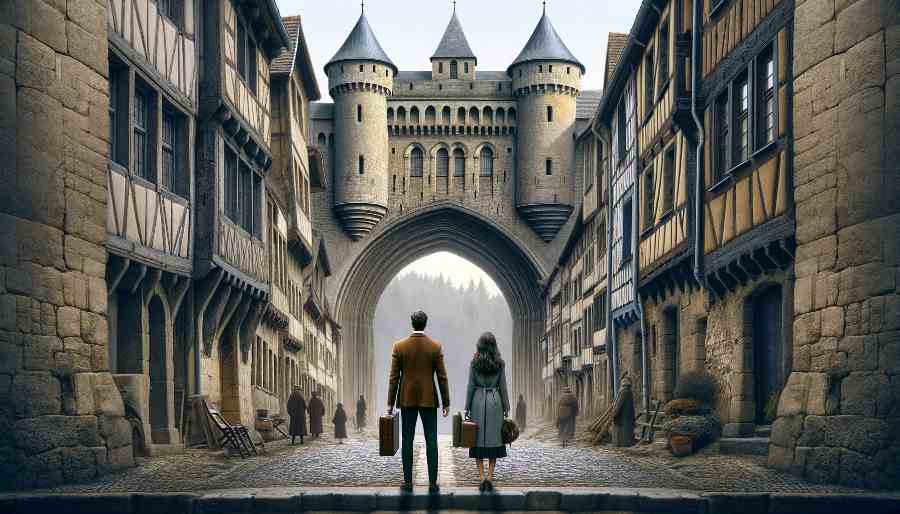
Another job of your story beginning is to introduce your main characters.
When I say 'introduce', I DON'T mean writing a formal introduction like this:
Olga was an attractive 35-year-old bank teller with a warm, extroverted personality, though she could also be impulsive and had a quick temper that sometimes got her in trouble...
That kind of introduction is a bit boring, and it doesn't make readers feel like they know the character.
Instead, you can SHOW the character doing and saying things that reveal what they're like.
Does Olga have trouble controlling her temper? Instead of saying so, you can show losing her temper during a job interview, sabotaging her chances of getting the job.
Readers will get to know your character the same way we get to know people in real life—by watching them in action.
The first part of a story is a chance to show:
- character flaws that will cause the story conflict, or make it worse
- character strengths that will allow them to overcome challenges during the story
- aspects of the character (habits, behaviors, beliefs, ways of thinking) that will change by the story's end.
Stories are generally more satisfying when the character evolves or changes in some way over the course of events. There's a "Before" version of the character who enters the story conflict, and an "After" version who emerges.
During the beginning of the story, you can show a "Before" version of the character in a way that will stand in contrast with the "After" version.
Setting readers' expectations

So, we've already talked about several tasks of your story beginning, including hooking readers' interest, introducing your main character and their world, and setting up your story conflict.
You don't have to accomplish all of this in your opening line! But you can keep these tasks in mind as you're writing the first part of your story.
Another task of your beginning is to set readers' expectations for the rest of the story.
What kind of story is it going to be? If it's a horror novel, readers will read with one set of expectations, and if it's a romantic comedy they'll read with another.
Readers who believe they've signed up for a romantic comedy will be upset if all of the characters are brutally slaughtered by a serial killer.
Does your story take place in the real world, or in a version of the world where magic exists? If there's magic, what rules and limitations does the magic have?
Let's say you're writing a World War II novel. Your hero, an American spy, is captured by the Germans, but escapes by summoning a dragon and flying away on its back.
If the dragon rescue occurs on Page 1, that's fine.
Also fine if it occurs on Page 254 but readers have known all along that the hero is a famous dragon tamer.
On the other hand, imagine that the novel reads as a realistic portrayal of World War II until Page 254, when there's a surprise dragon rescue. Readers will feel betrayed, like you've switched the rules on them.
They won't believe in the dragon rescue because you haven't trained them to believe in it.
As a writer, you get to set the rules of the game. But readers want to understand the rules, or else the game doesn't feel fair.
Examples of story beginnings

Let's look at some examples of story beginnings and the work each one is doing.
Example: BELOVED
BELOVED by Toni Morrison is a novel about characters who are literally haunted by the trauma of slavery. Here are the first two sentences.
"124 was spiteful. Full of a baby's venom."
In the first pages of BELOVED, readers learn that 124 is a house belonging to a formerly enslaved woman in 1873 Cincinnati. The house is haunted by the ghost of the woman's dead child.
This story beginning:
- provokes curiosity
- establishes the rules of this story's world (ghosts exist).
- immediately set up conflict.
Example: ELEGY FOR APRIL
Here's the opening sentence of Benjamin Black's mystery novel, ELEGY FOR APRIL:
"It was the worst of winter weather, and April Latimer was missing."
In one sentence, Black both sets up the novel's atmosphere and lets us know what the story's going to be about. The novel's first pages show April's friend Phoebe searching for April in foggy weather. Phoebe's actions start the plot moving right away, while Black's evocative descriptions of the fog create a sense of mood. Black introduces characters important to the story by showing them in action.
Example: "Gryphon"
Charles Baxter's short story "Gryphon" is about an eccentric and possibly sinister substitute teacher who disrupts the main character's world. Here's the first line:
"On Wednesday afternoon, between the geography lesson on ancient Egypt's hand-operated irrigation system and an art project that involved drawing a model city next to a mount, our fourth-grade teacher, Mr. Hibler, developed a cough."
In one sentence, Baxter shows the main character's ordinary world before the substitute teacher disrupts it—and shows the event that will set the plot in motion: a cough, that will get worse and cause Mr. Hibler to stay home, setting the stage for the substitute teacher's arrival.
Example: KLARA AND THE SUN
Here's the first line of Kazuo Ishiguro's novel KLARA AND THE SUN:
"When we were new, Rosa and I were mid-store, on the magazines table side, and could see through more than half of the window."
This sentence provokes curiosity because it's strange. "When we were new." What does that mean?
Quickly, readers gather that the novel is written from the point of view of a robot named Klara in a future version of our world.
The opening pages show Klara's daily existence in the robot store before Klara is sold to a family and the story's real conflict begins.
Example: "Ship in a Bottle"
Elizabeth Strout's short story "Ship in a Bottle" is about an 11-year-old girl named Winnie, who is forced to choose sides in a conflict between her sister Julie and her mother, Anita. Here's the story's opening line (Anita is speaking to Julie):
"You'll have to organize your days," Anita Harwood was saying, wiping at the kitchen counter.
By starting with dialogue, Strout pulls us right into the scene. She also introduces the character of Anita, showing her trying to control Julie's life. And she immediately sets up the conflict between Anita and Julie.
Example: SPINNING SILVER
Naomi Novik's novel SPINNING SILVER is based on the fairy tale "Rumpelstiltskin". Here's the first sentence:
"The real story isn't half as pretty as the one you've heard."
The novel's opening page goes on to remind us of the traditional version of "Rumpelstiltskin". It lets us know what kind of novel this is going to be—a fairy-tale retelling. And it provokes our curiosity by hinting that the "Rumpelstiltskin" we know has been sanitized in some way. Now we're wondering what the REAL story is...
Mistakes to avoid

Here are some common problems to watch out for as you’re revising your story beginning:
1) Starting with background information. For example, inexperienced writers sometimes start out with little biographies of their main characters. These story beginnings feel a little bit like Wikipedia articles about people who don't exist. They are not very interesting to read. Don't feel like you have to provide all of the information upfront. You can start your story with a scene or action and gradually weave in background details when/if they become necessary for the reader's understanding.
2) Starting too early in the story. If your story seems to take a long time to get interesting, consider starting right at the interesting point. You might have to lop off a few pages. Don't feel bad about throwing away part of your draft—those pages you throw away are not wasted work. They are part of a necessary process of exploration that showed you where your story has to go.
TIP: Someone once said that most short story manuscripts can be improved by cutting the first page, and most novel manuscripts by cutting the first chapter. See if you can improve your beginning by cutting.
3) Starting a different story. The creative process often leads writers down unexpected paths. You start out with a certain story in mind then are surprised at where it leads. As a result, the story's beginning (even if it seemed perfect when you wrote it) may not be an ideal fit with the rest of the story. When that happens, ask yourself: which version of the story do you like better? The version you started out writing? Or the version you ended up with? Based on your answer to this question, you know which part of the story you have to rewrite.
Click here to get our free fiction-writing course, Beginnings, Middles, and Endings.
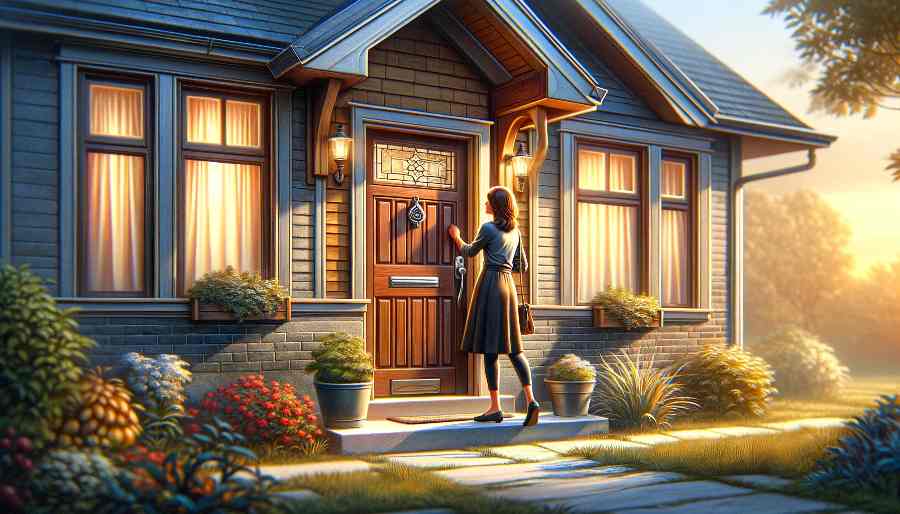
How to Start a Story - Next Steps
Join our free email group for more writing tips and ideas. You might also enjoy:
- Our 8-week course, Story Structure
- How to Craft a Story Plot
- How to Write a Mystery
- How to Write a Novel Outline
- Story Beginnings
© 2009-2024 William Victor, S.L., All Rights Reserved.
Terms - Returns & Cancellations - Affiliate Disclosure - Privacy Policy
5 ways to start a story: Choosing a bold beginning
Great authors show us there are many ways to start a story. You could begin a novel with a narrator/character introducing himself, like Salinger’s Holden Caufield or Dickens’ David Copperfield. Or you could begin in the thick of action, as Ray Bradbury’s does in his classic novel, Fahrenheit 451.
- Post author By Jordan
- 46 Comments on 5 ways to start a story: Choosing a bold beginning
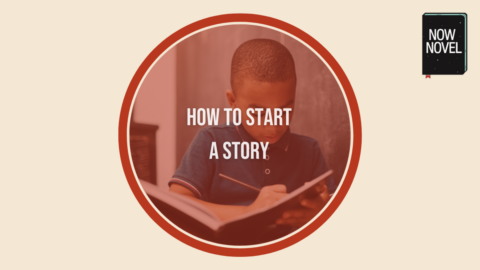
Great authors show us there are many ways to start a story. You could begin a novel with a narrator/character introducing himself, like Salinger’s Holden Caufield or Dickens’ David Copperfield. Or you could begin in the thick of action, as Ray Bradbury’s does in his classic novel, Fahrenheit 451 .
Have a read of the opening page or pages of authors you love, and explore how each starts a story, and notice how each is distinct from the other. A Stephen King novel will begin very differently from a Lianne Moriarty story, for example. Is there any bad writing? What makes it so, and what can you learn from it? Have they used active voice or passive voice? How does this change the opening? Compare a few to get a sense of the differences, and how each author’s distinct style comes through.
Before you begin, write down your story idea or your story structure. This doesn’t have to be a outline, but merely a few lines, stating the premise of that story.
Ways to start a story that engage your reader
These five types of story beginnings work:
Introduce readers to a memorable narrator-protagonist
Begin with crucial memories, start with ambiguous action, lead with a purposeful prologue, open with the unexpected.
Watch the summary video on ways to begin stories now, then read discussion of the story beginnings below:
This is how to start a story about a character coming of age or grappling with internal conflict . These novels typically use first person narration. From the first line, the reader gets to know a characterful narrator. Decide whether you will use a first person narrator, or another point of view.
For example, Salinger’s Holden Caulfield in The Catcher in the Rye (1951) has a strong voice and clear, disaffected teen persona:
‘If you really want to hear about it, the first thing you’ll probably want to know is where I was born, and what my lousy childhood was like, and how my parents were occupied and all before they had me, and all that David Copperfield kind of crap, but I don’t feel like going into it, if you want to know the truth.’ J.D. Salinger, Catcher in the Rye (1951)
This opening is effective because we get a strong sense of the character’s personality in his terse use of curse words, slang and adjectives (‘crap’, ‘lousy’). Being addressed directly by the narrator creates a sense of closeness and familiarity. This effect is similar to Charlotte Bronte’s ‘Reader, I married him’ in Jane Eyre .
Another strong example of this story opening type, the protagonist/narrator introduction, is Vladimir Nabokov’s Lolita (1955). Nabokov begins his entire novel with his depraved anti-hero, Humbert Humbert, musing on the name of Lolita, the young object of his obsession:
Lolita, light of my life, fire of my loins. My sin, my soul. Lo-lee-ta: the tip of the tongue taking a trip of three steps down the palate to tap, at three, on the teeth. Lo. Lee. Ta. Vladimir Nabokov, Lolita (1955)
Nabokov’s opening is strong because personality and character psychology are present from the first line.
When you start a story with your main character introducing themselves, remember to:
- Give them a distinctive voice: The grandiose language of Humbert Humbert fits the character, as do Salinger’s teen’s own cynical words.
- Show what matters to your character/narrator from the start: Holden values authenticity (‘if you want to know the truth’). We get a visceral sense of Humbert’s creepy obsession with Lolita through his rapture at even saying her name.
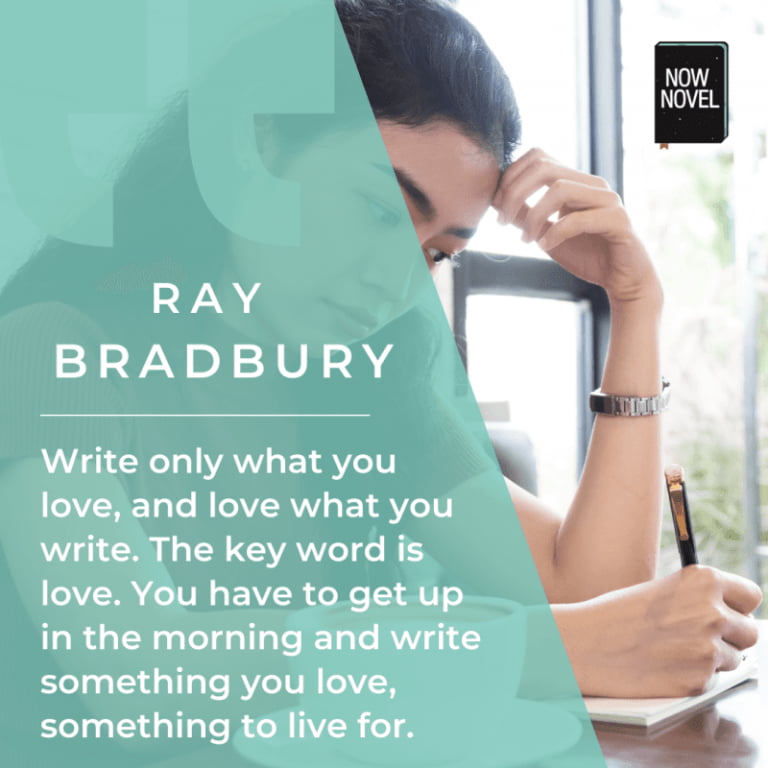
Often novels open with narrators recalling memories that are core to the plot. This can be part of the writing process and is of the ways to start a story that builds on a strong hook that is closely linked to your main plot. Tweet This
Starting with memories requires knowing your character well, such as how their backstory guides their goals, motivations and potential conflicts.
This is especially common in novels where a single, unforgettable event casts its shadow over the rest of the book (e.g. the murder in a murder mystery).
Framing an event in your story through a character’s memory gives it weight. It’s also a crucial part of character development. When you begin your novel with your main character remembering an earlier scene, it’s thus important to choose the right scene. As novel writing coach Romy Sommer says:
An issue I see with a lot of beginner writers is they tend to write the backstory as the story itself… that backstory is usually you as the writer writing it for yourself so you can understand the characters. ‘Understanding Character Arcs: How to create characters’, webinar preview here.
Consider that you might be describing too much of a character’s everyday life. While some details are good, remember that doing so should also serve the story, but not bog it it down in too many details.
Choose a scene that shows a dilemma or choice, or a powerfully emotional experience that is bound to have consequences for your character.
For example, Mark Haddon’s The Curious Incident of the Dog in the Night-time opens with the 15-year-old narrator Christopher finding his neighbour’s murdered dog:
It was 7 minutes after midnight. The dog was lying on the grass in the middle of the lawn in front of Mrs Shears’ house. Its eyes were closed. It looked as if it was running on its side, the way dogs run when they think they’re chasing a cat in a dream. But the dog was not running or asleep. The dog was dead. There was a garden fork sticking out of the dog. Mark Haddon, The Curious Incident of the Dog in the Night-time (2003)
Haddon’s opening is effective because it builds up to the revelation that the dog was killed violently. It’s effective because it raises questions we want answered.
When you begin with your narrator recalling a key memory, remember to:
- Choose a scene that immediately starts giving the reader keys to understanding: Haddon’s narrator proceeds to hug the bleeding dog, for example, so that we start to realise that Christopher is unusual in some way.
- Show the reader the memory: Haddon does not just say ‘Christopher found his neighbour’s dog, killed with a garden fork.’ We discover the dog through Christopher’s eyes, and this increases the scene’s impact.
Make a Strong Start to your Book
Join Kickstart your Novel and get professional feedback on your first three chapters and story synopsis, plus workbooks and videos.

A little bit of mystery or confusion at the start of your novel can help to reel readers in.
At the same time, make sure your opening isn’t so mystifying that the reader bails in frustration.
Even if the purpose or reasons for your ambiguous opening aren’t clear at first, the action itself must sustain readers’ interest until there is more clarity.
Consider the opening of Ray Bradbury’s Fahrenheit 451 :
It was a pleasure to burn. It was a special pleasure to see things eaten, to see things blackened and changed. With the brass nozzle in his fists, with this great python spitting its venemous kerosene upon the world, the blood pounded in his head, and his hands were the hands of some amazing conductor playing all the symphonies of blazing and burning to bring down the tatters and charcoal ruins of history.’ Ray Bradbury, Fahrenheit 451 (1953)
The first sentence is ambiguous – who, or what, is burning? The next slowly fills in context: We learn a character is using kerosene to burn something, to destroy ‘history’, but we still don’t know what exactly. We only learn by the end of the paragraph that the character Montag is burning books.
This way of beginning a story is effective because Bradbury prolongs a mixture of suspense and confusion, yet the character’s action itself is clear.
If you begin a book with ambiguous, teasing action:
- Give the reader answers to at least one (or some) of the ‘5 w’s’. We might not immediately know who is doing the burning (or what they’re burning), but Bradbury gives us a strong why : Pleasure. The relish with which Montag burns the books is clear
- By the end of the first paragraph, give the reader a little more clarity, as Bradbury does
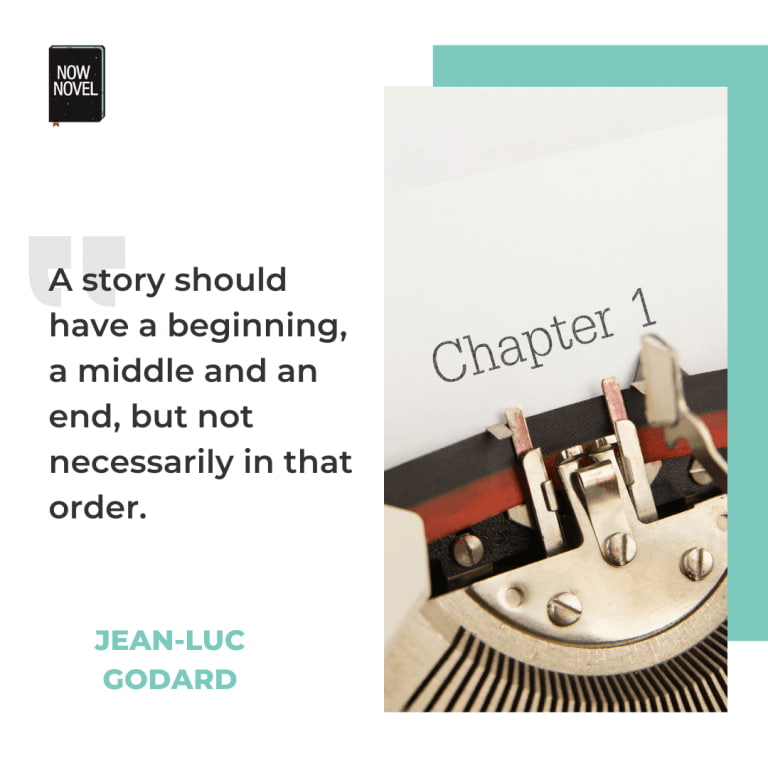
‘Prologue’ literally means the ‘before word’. This separate introductory or prefatory section in a novel has several uses:
- Giving broad historical context that paves the way for the main story
- Showing a scene or event preceding the main narrative, whose consequences ripple through the following story
Donna Tartt uses the second type of prologue to excellent effect in her mystery novel The Secret History . Her prologue tells us that a character is murdered, that the narrator is somehow complicit, and that he will narrate the events that led up to the murder in the coming narrative.
This teaser makes it clear that motive, rather than identity, is the main mystery behind the killing.
Tartt’s prologue wastes no time in revealing key information that shapes our expectations for the main story:
The snow in the mountains was melting and Bunny had been dead for several weeks before we came to understand the gravity of our situation. He’d been dead for ten days before they found him, you know. Donna Tartt, The Secret History (1992).
By immediately framing the story around Bunny’s murder and its aftermath, Tartt’s prologue directs our attention to the ground the coming story will cover. Not the fact of Bunny’s death but the swirl of events that spin out from this crime. It marks out a path into reading and making sense of the story.
Do you want to include a prologue in your book ? Ask:
Do the events in the first part of your book need telling explaining prior events?
If yes, why?
In Tartt’s case, giving away key events in the prologue is smart, structurally. Because the identity of the murder victim (and at least one person responsible) is revealed early, the main narrative of the story is free to focus on character motivations and consequences and not just crime-solving.
Would your story flow better if you told earlier events via character flashbacks or a prologue?
Try writing a scene as a prologue, then write the same scene as a flashback. Which fits the scene better?
If you’re unsure how to start your novel, our writing coaches will help you get on track.
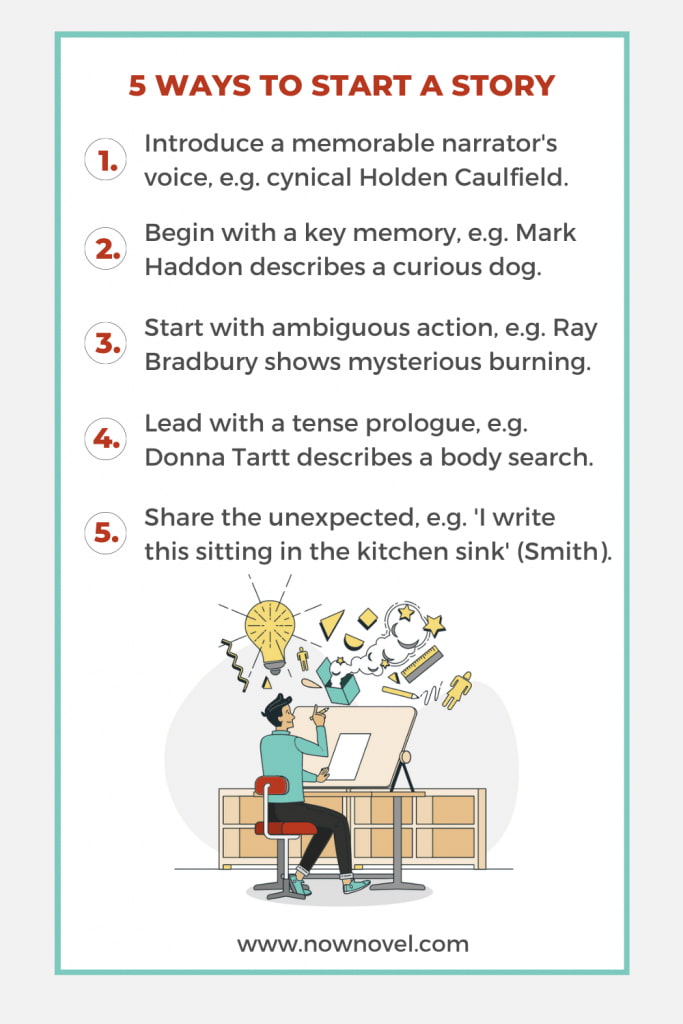
The most memorable story openings surprise us and make us pause for a moment.
Take Bradbury’s beginning to Fahrenheit 451 above, ‘It was a pleasure to burn.’ It’s unexpected.
This is partially because of its inner contradiction. We know that getting a burn from a hot plate is painful, and the idea of pleasure is thus surprising.
The ambiguity of ‘it’ means we don’t know initially whether the narrator is describing an odd pleasure in burning himself or burning something else.
Examples from famous books reveal this has always been one of the popular ways to start a story. For example, Dodie Smith opens I Capture the Castle (1949):
‘I write this sitting in the kitchen sink.’
The narrator Cassandra’s choice of sitting place is unusual, intriguing us to read the next sentence. Whichever way you choose to begin your novel, getting the reader to read the second sentence is the first, crucial feat.
Start your own novel now: brainstorm story themes, settings and characters and get helpful feedback from the Now Novel community.
Related Posts:
- How to start a fantasy story: 6 intriguing ways
- Writing a story from beginning to end: How to take…
- How to start a scene: 5 ways to reel readers in
- Tags ways to start a story. story beginnings
Jordan is a writer, editor, community manager and product developer. He received his BA Honours in English Literature and his undergraduate in English Literature and Music from the University of Cape Town.
46 replies on “5 ways to start a story: Choosing a bold beginning”
I feel you have made some excellent choices to illustrate the point of today’s lesson. Each extract is a finely crafted piece of flash fiction as it stands.
Glad you enjoyed the choices, Bob (and thanks for sharing on Twitter).
looking for a way to start my Wattpad story besides starting it with dialougue
Thank you for reading the blog 🙂
This is really interesting thanks <3
It’s a pleasure, Akane-chan, thanks for reading our blog!
Me, deciding how to start my story, brough me here. This gave an idea on how I would want start it. Thanks.
I’m glad to hear that, Daniel! It’s our pleasure, thanks for reading our articles. Good luck with your story.
How do I introduce a death flashback at the beginning of my story???
Hi Karthik, thank you for asking. If it’s a death flashback would that mean your viewpoint character is remembering their death from the afterlife? I’d suggest starting just before the event leading to their death so that the scene is already at a high point of tension. Good luck! We have some advice on writing flashbacks here: https://www.nownovel.com/blog/incorporate-flashbacks-into-a-story/
I’m writing a story where the female lead is posing as a male at this all boy’s school, where he missing father used to attend. I’m unsure if I should start with a history of the school, he family life and motives, a group of males figuring her out or a point in the story where said males already know of her true identity. Any tips?
Hi Eiseley, I would say starting with a high-stakes, high-tension moment (your protagonist’s identity being found out, for example) would be a good beginning – you can always circle back to how it is they came to be attending the school in disguise.
[…] http://www.education.com/lesson-plan/finding-the-moral/http://www.mensaforkids.org/teach/lesson-plans/the-art-of-storytelling/http://www.literacyideas.com/latest/2018/2/3/5-fun-ways-to-use-fables-in-your-literacy-lessonshttp://www.teachingenglish.org.uk/article/kids-storieshttps://www.nownovel.com/blog/ways-to-start-story-examples/ […]
“it was too late “she sigh. the act was already done .. do not know how to start this short story and include this sentence
Hi Shebekie, you’re getting there! I’d suggest editing to: ‘It was too late. She sighed – the deed was already done.’ To continue it, you could tease out the mystery surrounding the nature of the character’s deed further. For example, you could imply potential consequences (e.g. ‘Now she’d have to tell the others’).
Hi I’m trying to find out how to correctly start my sorry without boring the audience. The story is about a teenage boy transferring to a new high school which he finds a girl that is unloving and careless so he’s trying to win her heart over and prove that she can truly be loved.
Hi Darhnell, thank you for sharing that. I would say you have a good starting point in your MC transferring to a new high school, as that’s a situation that would likely be full of surprise, change, trepidation, anxiety, new friends (or new foes), etc. So showing the first time your character enters the new school, for example, or how he feels in the lead-up to arrival, would be one way to start.
Or you could start in medias res (in the middle of the action) with a significant moment during his first day at the new school. For example, his first interaction with the girl, circling back to how he got there later in the chapter. These are just some ideas. I hope this helps!
Hi, nice tips. I was wondering how to start a short story for 2 boys named Luke and Max stranded in their canoes. They were set on a research expedition on the animals in Antarctica but they got lost and couldn’t find anything. They are trying to head home by following the North star so they could reach their lab in Argentina. Pls, help me start. I was going with the idea of saying. “It was 7 minutes after midnight in Antarctica. The water swayed from ice-burg to ice-burg leaving a sparkling coat. Luke and Max were vigorously paddling their canoes towards the north start hoping at any moment they could get back to their warm and cpzy lab back in Argentina”
Hi Bob, thank you for the feedback and for sharing your idea. Not being much of an astronomer myself I had to check regarding Polaris (the North Star) and apparently it is only visible under certain conditions south of the equator, so perhaps they’d need another navigational technique. A compass, perhaps?
If it is after midnight and they are that far south, hypothermia would be a major risk, so perhaps the boys don’t get that far south to begin with? You can of course bend the rules of physics and geography in fiction if you want to tell a fantastical story. There are a few typos (‘ice-burg’ for ‘iceberg’, ‘start’ for ‘star’ and so forth) but other than that it is a suspenseful situation for an opening. Some readers may question the science behind some of the details mentioned though.
Beginning in the middle of the action is interesting, just make sure the exposition of the story continues to explain why the boys are there in the first place. I hope this is helpful!
Wow so good ways to start a story
Thank you, Priyank. Good luck with your own!
im writing a creative story about an orphan girl and im trying to craete the story but i need help any chance you would help me
Hi Ivokjuca, happily! What do you need help with? Please feel free to mail us at [email protected] too with your challenge.
Thank you very much for the tips… i was wondering how to start my story which i am writing about an incident of my life which is a complete secret to date. i hope this will help me start my piece
Hi Rashmi, it’s a pleasure! Good luck with starting your story and developing it further.
Thank you very much for the tips. it is really very helpful for me. Keep Sharing.
Thank you for your feedback, Anu! We will do so.
[…] https://www.nownovel.com/blog/ways-to-start-story-examples/ […]
Thanks a lot for this. It helped me a lot.
It’s a pleasure, thank you for reading our articles.
Hi there! I am a young writer (13 to be exact), and I am brainstorming for a way to start my first novel. Can you perhaps give me some inspiration? My novel is about three teenagers: Claire Minch, Samuel Ploy, and Sheila Crover. They live on a technologically advanced planet called Gyn, where the whole world’s population receives warnings from their future selves, or so they thought. In the end, I want it to state that instead of being warned by their future selves, the warnings are given by a Krewd (Demon) who has been leading them down the wrong path all along. Please give me some advice. I have been all over the internet, bt nothing really sparked my imagination for the start of my novel.
Hi Anani, thank you for sharing that (it’s great you’re working hard on your writing by the way).
It’s an interesting idea. Given the interesting warning system you described, starting with one of the warnings could be one way to go. How are the warnings broadcast, and is there a schedule (e.g. do they know when the warnings are going to come, do they each get their warnings at the same time, and is it transmitted via tech or something they just hear?).
Keep asking questions, as you will know best what to choose. Are you looking for inspiration for any particular character or part of the story?
I hope the questions I asked help!
It’s always good to read and learn about stories
That it is, Mark 🙂 Thanks for reading our blog.
I am trying to write a thriller and romantic story pls help me
Hi Nish, with pleasure. What aspect of the story would you like help with? Do you have a firm story idea developed already? What about it is giving you trouble? You can find all our articles on writing romantic stories here .
This tips were quite helpful. Though, I still have a few holes on how to start my story.
Thank you for sharing that, Georgina. What are there holes around? You might find this article on how to avoid plot holes helpful.
As a student and teacher of English, I had to read, write and teach a number of stories. I learnt about the essential plot parts, techniques, character-development and so on. The problem with me, while writing my own stories, I forgot mostly what I had learnt about story writing. I thought I was writing some really interesting stories though. I started sending my stories to online, offline magazines, started participating in Flash Fiction Contests where I had my fellow writers commenting on my stories. I felt that I could consider myself to be a competent writer. But aren’t competent, capable writers supposed to have name and fame? Aren’t they supposed to be rich? Even after having written over 500 short stories, forget about being rich, I wasn’t even earning a penny? If I don’t get published, if I don’t get paid by writing, am I going to die an unfulfilled writer? These questions have become paramount in my mind lately. In my early 60s, I am not sure any more if writing is the thing for someone like me with very little economic freedom. Writing is reaching a point in my retired life when it is not sheer fun anymore. My question to you is, would you still advise me to continue writing? Do you still think that there is a flicker of light at the end of the tunnel? Stay blessed.
Hi Rathin, thank you for sharing this personal account of your writing path. I would say it depends on your aims. To make money from writing, it is crucial to approach it as a business and do careful market research, invest time in marketing your work, and use every available resource (social media, Amazon author pages (if you’re listing work there), Goodreads, and other places such as book fairs to build an audience interested in what you have to say.
This being said, writing is lucrative for very few writers and many support their writing with side hustles. Fame and riches are goals beyond one’s immediate control, there being so many variable factors involved in earning them, so I would always advocate writing for passion and the pleasure of creation and communication above money or fame.
It is challenging to have ‘very little economic freedom’ as you describe, as that makes writing more of a luxury if it isn’t contributing income. Approaching it as a pleasure and an escape into creation rather than putting financial pressure on the process may be best for keeping the joy of it alive, though (one can do commercial writing such as copywriting for money as it tends to pay better per hours invested). I hope this is helpful, it is of course a highly subjective perspective.
This was so helpfull. And i think i know how i can start my story! But how will i switch from a prologue to a chapter
Hi Cliffton, thank you for sharing your kind feedback. I’m glad you have an idea about how you want to start your story. That’s a broad question, what information do you plan to share in your prologue? Many effective prologues do a little worldbuilding while creating a little curiosity, then the first chapter picks up with immediate, scene-level action or a character’s voice (the prologue giving more of a general sense of a situation, place or mood). There are so many ways to use a prologue – the main thing is to make it as interesting and curiosity rousing as chapter 1. Here’s something I wrote on prologues you may find useful.
Thanks for this useful tips.
Thanks George, glad you found them useful.
Leave a Reply Cancel reply
Your email address will not be published. Required fields are marked *
Pin It on Pinterest

- People Directory
- Safety at UD

- Campus & Community
- Nation & World
- Culture & Society

Researching the history of creative writing
Article by Megan M.F. Everhart Photo illustration by Jaynell Keely July 16, 2024
UD student documents trends in storytelling and advice for aspiring writers from the Great Depression through World War II
Margaret Armstrong, an undergraduate student at the University of Delaware, remembers sitting in her fiction writing class and hearing her professor tell the class there weren’t any restrictions on what the students could write. No topic was off limits. She also knows that aspiring writers in the early 20th century heard vastly different advice about how to be successful.
Armstrong, an honors English and Spanish double major, is a 2024 Summer Scholar researching the evolution of advice for “good” writing, getting published and having your work seen, through examining archival issues of Writer’s Digest , an industry publication that began in 1920 aimed at helping writers improve their craft.
Her project covers the first 25 years of Writer’s Digest , from 1920 through the World War II era, tracking how advice to aspiring writers reflects American culture, economics and politics of the time, and how it shaped American writing.
Project beginnings
Last spring, Armstrong began working with Siobhan Carroll, associate professor of English, on her research project examining the development of character agency in novels from 1791-1859. To establish relevance between her research and modern scholarship, Carroll wanted to know how writers in the early 20th century understood the concept of character agency, the term for how a character’s motivation and actions direct the story, and she tasked Armstrong with reading old issues of Writer’s Digest magazine.
While Carroll asked Armstrong to document advice and trends specific to character agency, she was also free to note other ideas she found in the old issues, and this is where things got more interesting. Magazine issues from 1920-1945 said little about character agency, but Armstrong identified trends in plot development, Hollywood influence, government propaganda and censorship in the issues spanning 1920-1945.
“Margaret has a good eye for the archive. She’s curious about what she reads and is able to make connections on her own,” Carroll said. “It became very clear that she was starting to take ownership of the project and think about what was happening in the world of creative writing.”
From Hollywood to the War Department
The earliest Writer’s Digest issues from the 1920s spoke about “photoplays,” a term for silent movie scripts. With their lack of dialogue, photoplays were purely driven by plot and action. As Armstrong found, this emphasis on action carried over to other genres, as writers were encouraged to immediately place their characters in situations that would cause conflict. Character motivation wasn’t an important element, as characters would merely react to the situation writers placed them in.
Hollywood’s influence was also apparent in the 1930s, but the advice concerned censorship, as Writer’s Digest of the era echoed Hollywood’s Hays Code, implemented in 1934, that urged “moral” and “wholesome” storytelling, with prohibitions against excessive alcohol use and overt sexual situations, especially for female characters.
By the 1940s, Writer’s Digest included articles written by the U.S. War Department urging writers to include pro-American, anti-German themes in their work. It’s hard to imagine a modern government agency encouraging such blatant propaganda, but Carroll explained that writers face similar pressures today.
“Realistically, censorship is all around us. The majority of writers want to sell their work, and that makes them attentive to what will be easy to get published versus not,” she said. “News sources and social media offer writers important direction on what is acceptable or not. It’s internal censorship.”
Action and impact
Armstrong has already applied some of the advice for writing she has found, including lists of stock characters and formulas of successful stories from genres like pulp fiction and crime stories, to her own creative writing.
“It’s made me want to start the action off immediately by dropping characters into situations that create conflict for them,” she said.
She also noted that having relatable characters has always been important.
“I think everybody wants to read about characters that they relate to in some way,” she said. “In the early research I found that usually meant people want to read about good people and relate to good things. Now I see people relating to more complex characters.”
Armstrong is used to editing and adapting her own work, skills she’s developed in her creative writing courses at UD, where students share their writing with the class.
“The whole point is getting comfortable with sharing your work, and receiving and listening to criticism, too. Any feedback is good feedback,” she said.
She took a similar approach this year as a student editor for Caesura , UD’s student-run literary magazine. The decision of whose work to publish was challenging, but also rewarding.
“I think it's just good practice to notice what you like and don't like in other people's writing, and then see how that influences your own too. It can also help show you new ideas,” she said.
Armstrong’s work this summer builds on research she began last summer and continued throughout the past academic year. She presented her initial findings at the Winter Showcase of Undergraduate Research and will present her additional research at the Summer Symposium in August.
Literature, creativity and practicality
Armstrong’s guidance counselor in Clark Summit, Pennsylvania, recommended UD for the Department of English, and Armstrong said it was the right decision. She said she appreciates all the department has to offer and that students can specialize in certain areas or take diverse classes.
“It’s a very free major,” she said. “We have creative writing classes and literature classes, but there are also really practical options like grant writing.”
When she’s not writing her own work, Armstrong enjoys horror fiction and the poetry of Pablo Neruda, and her project has sparked an interest in pulp fiction, too.
“At the end of the day, I want to enjoy what I’m reading, and I think that should be the goal for everybody,” she said. “If you’re focused on reading for some specific reason, are you always enjoying it?”
More Culture & Society Stories
Supporting lgbtq+ youth.
June 26, 2024
Article by Jessica Henderson
Juneteenth 2024
June 18, 2024
Article by UDaily Staff
Depictions of fatherhood
June 14, 2024
Article by Marina Jones
See More Stories
Subscribe to UDaily >
Have a udaily story idea.
Contact us at [email protected]
Members of the press
Contact us at 302-831-NEWS or visit the Media Relations website
ADVERTISEMENT
- Campus & Community
- Nation & World
- Culture & Society
- UD Magazine
- In Memoriam
- Media Experts
Office of Communications & Marketing 105 E. Main St. Newark, DE 19716 [email protected] Phone: 302-831-2792

Writing Creatively to Make Sense of the Times We Live In
Journalist katrin schumann talks about why she writes fiction..
Updated July 12, 2024 | Reviewed by Davia Sills
- Studies show that the act of all kinds of writing hones our reflective abilities.
- Creative writing stretches our imagination, increases emotional resilience, and alleviates stress.
- Writers of nonfiction examine complex issues that are relevant to our times.
- Novelists examine the issues using characters as a vehicle for empathy.
Studies show that the act of writing hones our reflective abilities, stretches our imagination , increases emotional resilience , and alleviates stress . In my conversation with journalist-turned-novelist Katrin Schumann, we discuss how creative writing, in particular, is a worthy pursuit to understand the issues of our time. Schumann is the author of the nonfiction books Mothers Need Time Outs Too and The Secret Life of Middle Children, as well as the novels The Forgotten Hours and This Terrible Beauty .
You’re a trained journalist and the author of nonfiction books. Why, in the last few years, have you focused on writing fiction?
Writing nonfiction has been a way for me to examine complex issues that are relevant to our times, including psychological ones, but I’ve found that in recent years, I’ve been drawn to fiction because it allows me to get closer to the subject. In exploring thorny issues like loyalty and trust or co-dependency , I’m able to do more of a deep dive in fiction. The form allows me to sit with the complexities, to live in the gray areas with my characters.
I can’t always do this with nonfiction, where I’m approaching the topic from a specific angle, seeking solutions. In fiction, I have space to explore nuances that fascinate and confuse me and try to make sense of the inevitable contradictions. It’s messier and more delicate than nonfiction. For me, this feels more true to the human experience.
All writing involves deep reflection. Do you find the act of writing fiction to be a different kind of therapy?
Yes. Spending years creating characters and situations that grapple with serious, real-world problems lets me explore my own difficult experiences. For instance, I’d been wrestling with the aftermath of dealing with a narcissist when I started writing my first novel. By fictionalizing those challenges, I was able to find the courage to linger in the dark areas, examining them from all angles in order to find where the light might get in.
I discovered greater empathy and resilience in myself while also being able to acknowledge the trauma I’d been through. It’s using my imagination, combined with researching some very real and current psychological challenges, that ultimately feels most powerful to me and an effective way to reach readers.
How does fictionalizing the story give you more latitude or depth in exploring topics? You write about things like self-reliance and depression, and I’m wondering why not just write articles about it.
I write to figure out my own issues and to learn, but also to share. For me, fiction writing makes me work harder and go deeper. I’m trying to change people’s minds and hearts in subtler ways. I’m reflecting on experiences I’ve had, wrestling with what they mean, and how we can all learn from them and come out the better for it.
Yet, I don’t want to be prescriptive; I want people to draw their own conclusions. I research deeply about whatever topic I’m tackling.
To write my last novel, I studied the history of neuropsychology, dissecting studies on substance abuse . I conducted interviews. For all my books, I gather and study facts and figures, but with novels, I take that a step further. I put those facts and figures into play with my imagined characters to explore what happens. I imbue the impersonal with empathy and allow readers to try to figure out how they feel about how the characters contend with the issue. This approach leads me to meaningful personal discoveries while also taking the reader along on the emotional journey.
How do you decide whether to approach a topic in a nonfiction book or in a novel?
The more I’m personally involved with the topic, the more I want to explore it in fictional form. Ironically, for fiction, I feel like I should have an even better understanding of some of these psychological challenges than if I were covering them through straight nonfiction reportage. I first have to understand the topic and its history so my story is not only realistic but feels authentic.
I want readers to trust me, which means I have to be thorough. It’s my aim to take them on a ride that’s compelling as well as informative. And I love learning something new when I’m immersed in researching and writing fiction.
If writing fiction is about wrestling with your own demons, why not simply journal?

Journaling is, without question, a beneficial reflective activity. Yet what differentiates this kind of work from journaling about our problems or writing blog posts is that novelists are committing more time and energy to the deep dive on a specific topic. My last novel took almost three years to write, and during that time, I was reading everything I could get my hands on about the topic in order to distill it so that readers might find it relevant to their own lives.
At that stage, it’s not really about me anymore; it’s about the human condition. And in the end, that’s what readers relate to, I think. It’s what makes them call their friends and say, “I just finished this great book. You’ve got to read it.”
More about Katrin Schumann 's work

Lynne Griffin, R.N., M.Ed. , researches family life and is a novelist.
- Find a Therapist
- Find a Treatment Center
- Find a Psychiatrist
- Find a Support Group
- Find Online Therapy
- International
- New Zealand
- South Africa
- Switzerland
- Asperger's
- Bipolar Disorder
- Chronic Pain
- Eating Disorders
- Passive Aggression
- Personality
- Goal Setting
- Positive Psychology
- Stopping Smoking
- Low Sexual Desire
- Relationships
- Child Development
- Self Tests NEW
- Therapy Center
- Diagnosis Dictionary
- Types of Therapy

Sticking up for yourself is no easy task. But there are concrete skills you can use to hone your assertiveness and advocate for yourself.
- Emotional Intelligence
- Gaslighting
- Affective Forecasting
- Neuroscience
MIT Technology Review
- Newsletters
AI can make you more creative—but it has limits
Although it can boost individuals’ creativity, it seems to homogenize and flatten our collective output.
- Rhiannon Williams archive page

Generative AI models have made it simpler and quicker to produce everything from text passages and images to video clips and audio tracks. Texts and media that might have taken years for humans to create can now be generated in seconds .
But while AI’s output can certainly seem creative , do these models actually boost human creativity?
That’s what two researchers set out to explore in new research published today in Science Advances , studying how people used OpenAI’s large language model GPT-4 to write short stories.
The model was helpful—but only to an extent. They found that while AI improved the output of less creative writers, it made little difference to the quality of the stories produced by writers who were already creative. The stories in which AI had played a part were also more similar to each other than those dreamed up entirely by humans.
The research adds to the growing body of work investigating how generative AI affects human creativity , suggesting that although access to AI can offer a creative boost to an individual, it reduces creativity in the aggregate.
To understand generative AI’s effect on humans’ creativity, we first need to determine how creativity is measured. This study used two metrics: novelty and usefulness. Novelty refers to a story’s originality, while usefulness in this context reflects the possibility that each resulting short story could be developed into a book or other publishable work.
First, the authors recruited 293 people through the research platform Prolific to complete a task designed to measure their inherent creativity. Participants were instructed to provide 10 words that were as different from each other as possible.
Next, the participants were asked to write an eight-sentence story for young adults on one of three topics: an adventure in the jungle, on open seas, or on a different planet. First, though, they were randomly sorted into three groups. The first group had to rely solely on their own ideas, while the second group was given the option to receive a single story idea from GPT-4. The third group could elect to receive up to five story ideas from the AI model.
Of the participants with the option of AI assistance, the vast majority—88.4%—took advantage of it. They were then asked to evaluate how creative they thought their stories were, before a separate group of 600 recruits reviewed their efforts. Each reviewer was shown six stories and asked to give feedback on the stylistic characteristics, novelty, and usefulness of the story. The researchers found that the writers with the greatest level of access to the AI model were evaluated as showing the most creativity. Of these, the writers who had scored as less creative on the first test benefited the most.
However, the stories produced by writers who were already creative didn’t get the same boost. “We see this leveling effect where the least creative writers get the biggest benefit,” says Anil Doshi, an assistant professor at the UCL School of Management in the UK, who coauthored the paper. “But we don’t see any kind of respective benefit to be gained from the people who are already inherently creative.”
The findings make sense, given that people who are already creative don’t really need to use AI to be creative, says Tuhin Chakrabarty, a computer science researcher at Columbia University, who specializes in AI and creativity but wasn’t involved in the study.
There are some potential drawbacks to taking advantage of the model’s help, too. AI-generated stories across the board are similar in terms of semantics and content, Chakrabarty says, and AI-generated writing is full of telltale giveaways, such as very long, exposition-heavy sentences that contain lots of stereotypes.
“These kinds of idiosyncrasies probably also reduce the overall creativity,” he says. “Good writing is all about showing, not telling. AI is always telling.”
Because stories generated by AI models can only draw from the data that those models have been trained on, those produced in the study were less distinctive than the ideas the human participants came up with entirely on their own. If the publishing industry were to embrace generative AI, the books we read could become more homogenous, because they would all be produced by models trained on the same corpus.
Artificial intelligence
What is ai.
Everyone thinks they know but no one can agree. And that’s a problem.
- Will Douglas Heaven archive page
What are AI agents?
The next big thing is AI tools that can do more complex tasks. Here’s how they will work.
- Melissa Heikkilä archive page
How to use AI to plan your next vacation
AI tools can be useful for everything from booking flights to translating menus.
Why Google’s AI Overviews gets things wrong
Google’s new AI search feature is a mess. So why is it telling us to eat rocks and gluey pizza, and can it be fixed?
Stay connected
Get the latest updates from mit technology review.
Discover special offers, top stories, upcoming events, and more.
Thank you for submitting your email!
It looks like something went wrong.
We’re having trouble saving your preferences. Try refreshing this page and updating them one more time. If you continue to get this message, reach out to us at [email protected] with a list of newsletters you’d like to receive.

The Irreconcilable Versions of J.D. Vance in ‘Hillbilly Elegy’
Even before the Republican vice-presidential nominee aligned himself with Donald Trump, contradiction was central to his rags-to-riches biography.
J.D. Vance became the Republican vice-presidential nominee on Wednesday, running with a man he once speculated could be “America’s Hitler.” Credit... Todd Heisler/The New York Times
Supported by
- Share full article

By Mike McIntire
- July 18, 2024
Much has been made of the political pirouette J.D. Vance executed to secure the embrace of Donald J. Trump, a man he once called “cultural heroin” before seeking his endorsement for the Senate and, Wednesday night, accepting the Republican nomination to be his vice president.
Old friends and former classmates have expressed bewilderment at the seemingly irreconcilable versions of Mr. Vance. But contradiction has been central to Mr. Vance’s biography, nowhere more so than in his popular 2016 book, “Hillbilly Elegy: A Memoir of a Family and Culture in Crisis.”
The memoir, whose political dividends have far exceeded the millions of dollars it has paid in royalties and movie rights, emerged at a pivotal point in national politics, quickly becoming a go-to guide to the white underclass discontent that propelled Mr. Trump’s surprise presidential victory.
Mr. Vance used his personal account of overcoming dysfunctional Appalachian family values to tell a larger story about forgotten Americans. In his acceptance speech at the Republican National Convention in Milwaukee, he leaned again into those themes, at one point drawing attention to his mother, “who struggled with money and addiction but never gave up.” She stood in the audience when he continued, “And I’m proud to say that tonight my mom is here, 10 years clean and sober.”
But during Mr. Trump’s presidency, reaction to the book, like so much else in culture and politics, became increasingly polarized. While he expected pushback, Mr. Vance was confused by the attacks from opposite ends of the ideological spectrum, he professed in an afterword appended to the book in 2018.
“I’ve heard, for instance, from someone on the Left that my book is a victim-blaming piece of anti-government libertarianism,” he wrote, adding that “someone on the Right” had complained that the book’s premise “would justify a massive expansion of government welfare programs.”
We are having trouble retrieving the article content.
Please enable JavaScript in your browser settings.
Thank you for your patience while we verify access. If you are in Reader mode please exit and log into your Times account, or subscribe for all of The Times.
Thank you for your patience while we verify access.
Already a subscriber? Log in .
Want all of The Times? Subscribe .
Advertisement

COMMENTS
In this post, we have listed over 150 story starters to get your story started with a bang! A great way to use these story starters is at the start of the Finish The Story game. Click the 'Random' button to get a random story starter. Random. If you want more story starters, check out this video on some creative story starter sentences to use ...
Creative writing class was a place where stories were born, but something was alive in the words, and it wanted out. 20. The little girl's best friend was a ghost, or so she thought, until the day she found old photos in the attic. 21. As the clock struck midnight, a phone rang in an empty office, and the message was for you. 22.
Idea #11: Disorient the Reader. Another great way to start a story is to disorient your readers. Throw them off-balance and make them re-read the opening lines more than once. A great example is from George Orwell's Nineteen Eighty-Four: "It was a bright cold day in April, and the clocks were striking thirteen.".
10 Short Story Ideas by Joe Bunting - The world of writing - […] writers have too many short story ideas, not too few. However, therein lies the problem, because the more ideas you…. The Lure of A New Story - Comma Grounds - […] But before you go, check out this list of Top 100 Short Story Ideas!
Above all, enjoy! Here's what you'll find in this post: Table Of Contents. List #1 — 55 Story Prompts, Creative Writing Prompts, and Story Starters for Kids. BONUS List #2 — 13 Finish The Story Writing Prompts. NEW! List #3 - 30 Story Starters for Student Writers. 367 More Story Writing Ideas.
A long list of creative writing prompts and writing ideas. 1. Symphony of the Skies. Imagine a world where music can literally change the weather. Write a story about a character who uses this power to communicate emotions, transforming the skies to reflect their inner turmoil or joy. 2.
Here's how our contest works: every Friday, we send out a newsletter containing five creative writing prompts. Each week, the story ideas center around a different theme. Authors then have one week — until the following Friday — to submit a short story based on one of our prompts. A winner is picked each week to win $250 and is highlighted ...
Spark your imagination with these 100+first line writing prompts for all ages! These simple one-liners are the perfect way to get those creative juices flowing and find inspiration for your next big short story or flash fiction . We have a mix of first-line writing prompts, ranging from fantasy prompts to non-fictional and realistic events.
8. Do something new with your writing. 9. Create tension that has room to grow. 10. Capture your readers' attention. 1. Craft an unexpected story opening. Some of the most memorable opening lines are ones that hook readers with something out of the ordinary.
Enjoy these first line generator ideas for writing a short story. 1. With his background and fierce appearance, no one expected Bruno the mastiff to be a good dog for small children. 2. She frowned thoughtfully at the tarot cards arranged before her. 3.
10 Creative Writing Prompts for Story Ideas. Whether you're trying to start a new story, or struggling with writer's block in the middle of one, ideas may seem difficult to come by. To discover your next novel or short story idea, exercise your creative writing muscle with this list of creative writing prompts and story starters that will ...
The beginning lines of a story should establish a character, in a setting, with a problem. Tweet this. Tweet. Beyond that, there are so many ways to go. Here are ten ways to start a story you might consider: 1. Strong Voice.
51 Story Starter Sentences. Suddenly, icy fingers grabbed my arm as I inched through the darkness. I suddenly found out that I was heir to a throne…. She opened the letter and it said she'd won $100,000. When I flipped on the radio that night, I couldn't believe the voice I heard coming through the speakers. I still remember the day I was ...
The Story Starter randomly generates 8,286,052,608 writing prompts. This idea generator can be used by novelists, screenwriters, teachers, short story writers, and more. It has been used by writers of all ages. Write your story starter sentence on a piece of paper or copy and paste it into your favorite word processor and start writing your story!
Whether it's your personal goal to sit down and write or you'd like to inspire your children or students to write, we have 25 story starters and creative writing prompt ideas that'll up the ante on your creative writing panache.
Here are the steps for how to start a story: Write a strong opening sentence. Connect the readers and character. Produce intrigue. Elicit an emotion in your story. Start your story with a strong visual snapshot. Write a compelling first paragraph. Leave a hint.
18. Sarcastic. "It is a truth universally acknowledged, that a single man in possession of a good fortune, must be in want of a wife.". — Jane Austen, Pride and Prejudice. Austen didn't invent the word snark — but she certainly refined the application of the quality.
3. Enticing story beginnings make bold statements. The opening sentence of Leo Tolstoy's Anna Karenina (Constance Garnett translation) is another famous first line from classic fiction: Happy families are all alike; every unhappy family is unhappy in its own way. Leo Tolstoy, Anna Karenina (1878, trans. 1901), p.
2) Start with a problem or conflict. This could be a small problem; for example, your character is about to miss their bus home. Even a small problem gives your main character something to do and creates some activity and momentum right away. 3) Start at an exciting point in the story.
These five types of story beginnings work: Introduce readers to a memorable narrator-protagonist. Begin with crucial memories. Start with ambiguous action. Lead with a purposeful prologue. Open with the unexpected. Watch the summary video on ways to begin stories now, then read discussion of the story beginnings below:
1. Dialogue. Nothing draws readers in like introducing them to your characters in the middle of an ongoing conversation. If you want to use dialogue to open up your story, you can choose to start with a heated conversation that leads to action, or even casual talk that introduces to the characters and their relationships.
Story starters, or writing prompts, are a great way to get middle school students into creative writing. Story starter sentences get the creative juices flowing by giving students the opening sentence or first sentence of a short story. Having an opening line is easier than staring at a blank page. It gets students to write a story even when ...
Here Are Some Quick Pointers: • Introduce Your Primary Character Quickly. For a lot of stories, readers care about the plot of the story just as they care about the primary character. So try to introduce your main character as soon as you start your story, as readers tend to build an emotional relationship with him or her.
Margaret Armstrong presented her research on the history of creative writing at the February Winter Fellow showcase. ... and how it shaped American writing. Project beginnings. Last spring, Armstrong began working with Siobhan Carroll, associate professor of English, on her research project examining the development of character agency in ...
MISSION STATEMENT As the CUNY SPS Creative Writing Club, we will come together once a month and answer writing prompts. We will use our creativity to enhance our writing skills and create an environment of safety. We will gain new writing skills and showcase our talent. We will share our love for writing and creating new stories. VISION STATEMENT As a club, we hope to inspire
Taylor Swift Writing Prompts are creative writing prompts inspired by Taylor Swift's music, lyrics, and persona. They are designed to spark your creativity and make writing more fun. 2.
Studies show the act of writing hones our reflective abilities, stretches our imagination, increases emotional resilience, and alleviates stress. Creative writing is a pursuit.
AI-generated stories across the board are similar in terms of semantics and content, Chakrabarty says, and AI-generated writing is full of telltale giveaways, such as very long, exposition-heavy ...
People Close to Biden Say He Appears to Accept He May Have to Leave the Race. One person familiar with President Biden's thinking cautioned that he had not yet made up his mind to leave the race ...
In The Atlantic — the same magazine where Mr. Vance had called Mr. Trump "cultural heroin" — Tom Nichols, a Republican-turned-independent, said he had once been "intrigued by his writing ...